Z tego przewodnika dowiesz się, jak za pomocą zapośredniczenia AdMob wczytywać i wyświetlać reklamy z Unity Ads, w tym reklamy zintegrowane z określaniem stawek i kaskadą.Google Mobile Ads SDK Wyjaśniamy w nim, jak dodać reklamy Unity do konfiguracji zapośredniczenia jednostki reklamowej oraz jak zintegrować pakiet SDK i adapter reklam Unity z aplikacją na iOS.
Obsługiwane integracje i formaty reklam
Adapter zapośredniczenia w przypadku Unity Ads ma te możliwości:
| Integracja | |
|---|---|
| Określanie stawek | |
| Wodospad | 1 |
| Formaty | |
| Baner | |
| Pełnoekranowa | |
| Z nagrodą | |
| Natywna | |
Wymagania
iOS w wersji 12.0 lub nowszej
[W przypadku określania stawek]: aby zintegrować wszystkie obsługiwane formaty reklam w określaniu stawek, użyj adaptera Unity w wersji 4.14.1.1 lub nowszej (zalecana jest najnowsza wersja).
Nowości na kanale Google Mobile Ads SDK
Zapoznaj się z przewodnikiem dla początkujących dotyczącym zapośredniczenia.
Krok 1. Skonfiguruj ustawienia w interfejsie Unity Ads
Zarejestruj się lub zaloguj w Unity Ads.
Utwórz projekt
W panelu Unity Ads przejdź do Projektów i kliknij Nowy.
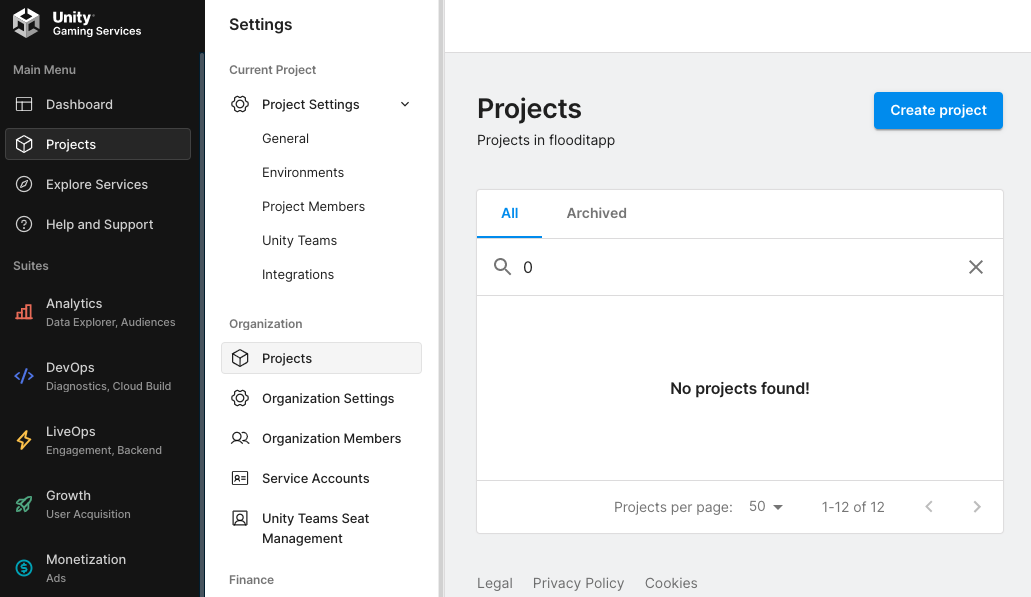
Wypełnij formularz i kliknij Utwórz, aby dodać projekt.
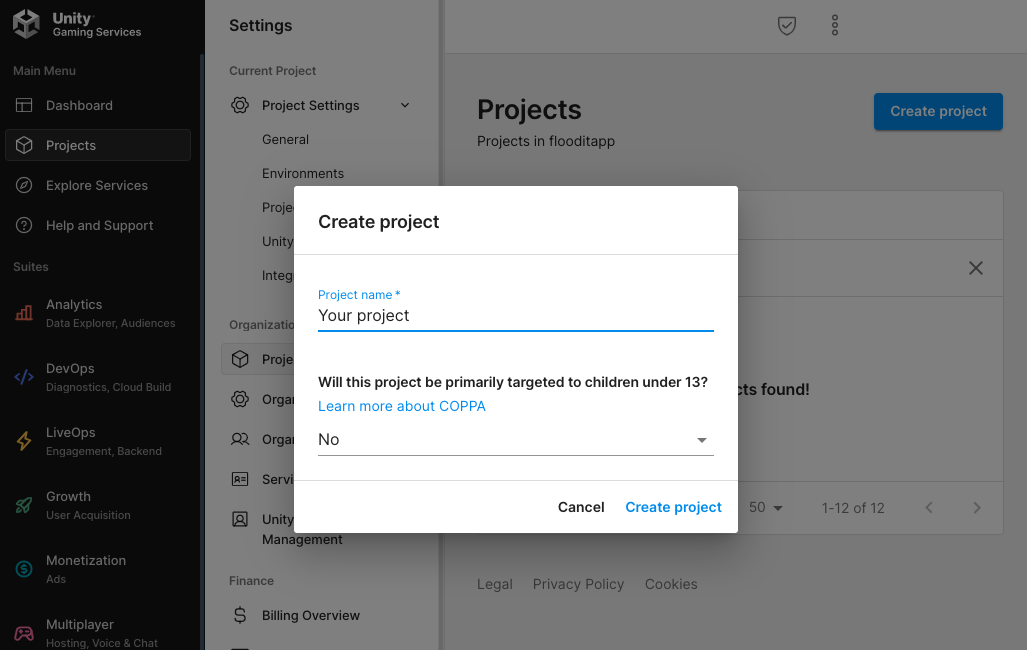
Kliknij kolejno Zarabianie na reklamach Unity i Rozpocznij.
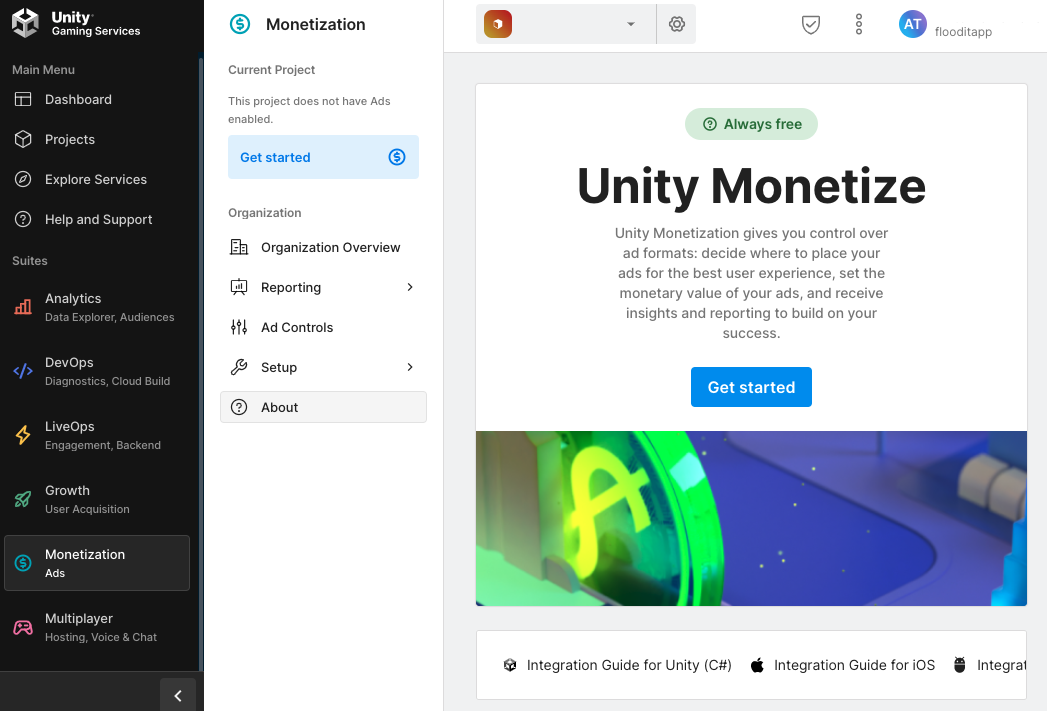
W oknie Nowy projekt wybierz Będę korzystać z mediacji i Google AdMob jako Partnera mediacji, a potem kliknij Dalej.
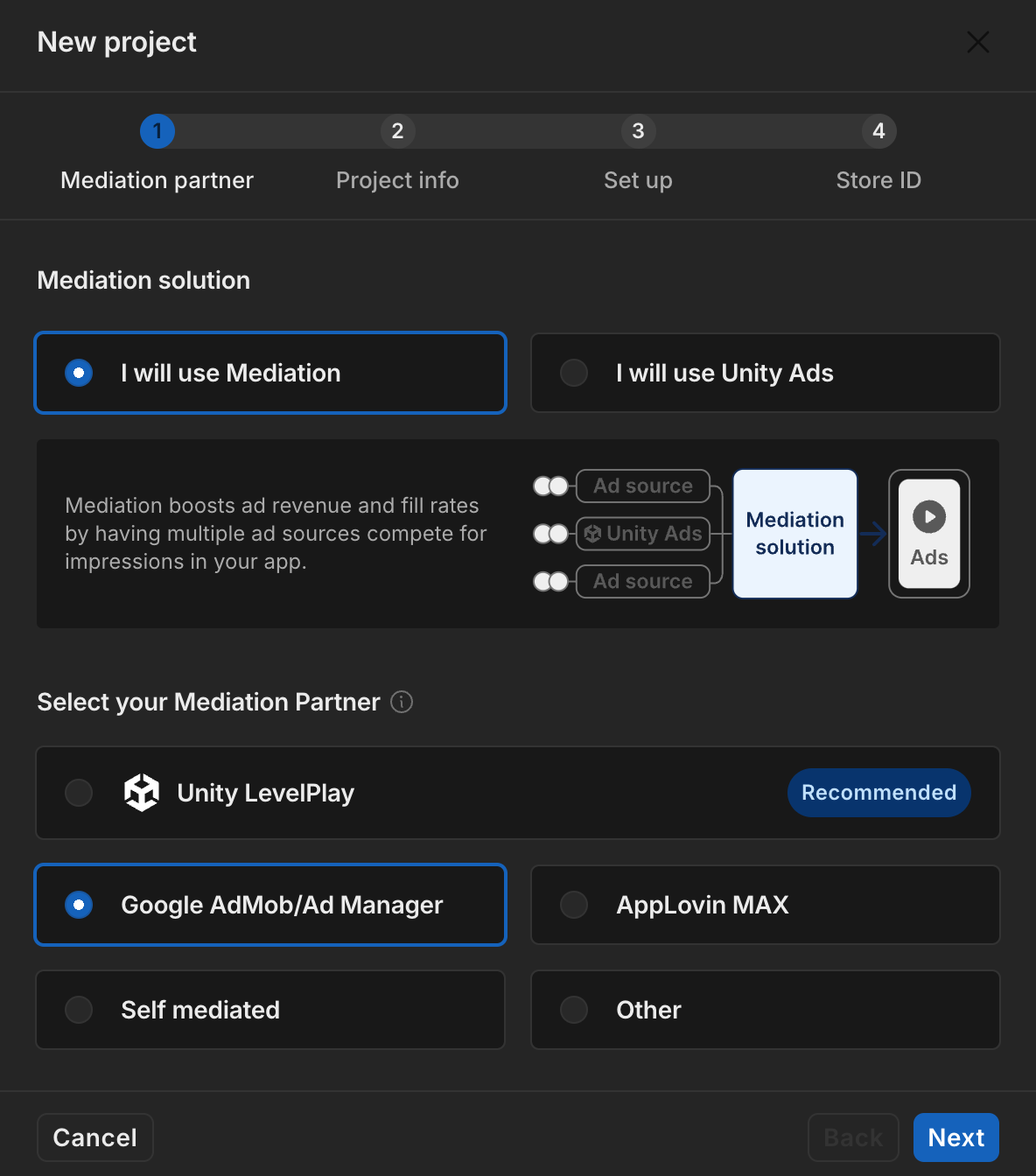
Wybierz opcję ustawień reklam, a następnie kliknij Dalej.
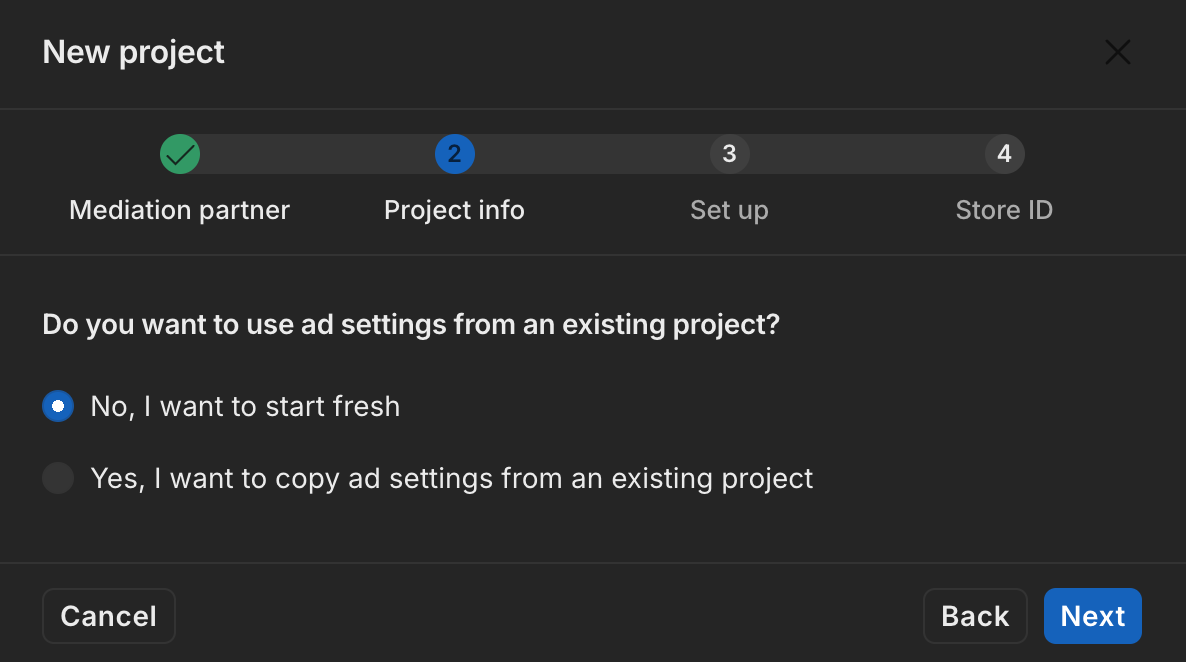
Wybierz konfigurację miejsca docelowego, a potem kliknij Dalej.
Określanie stawek
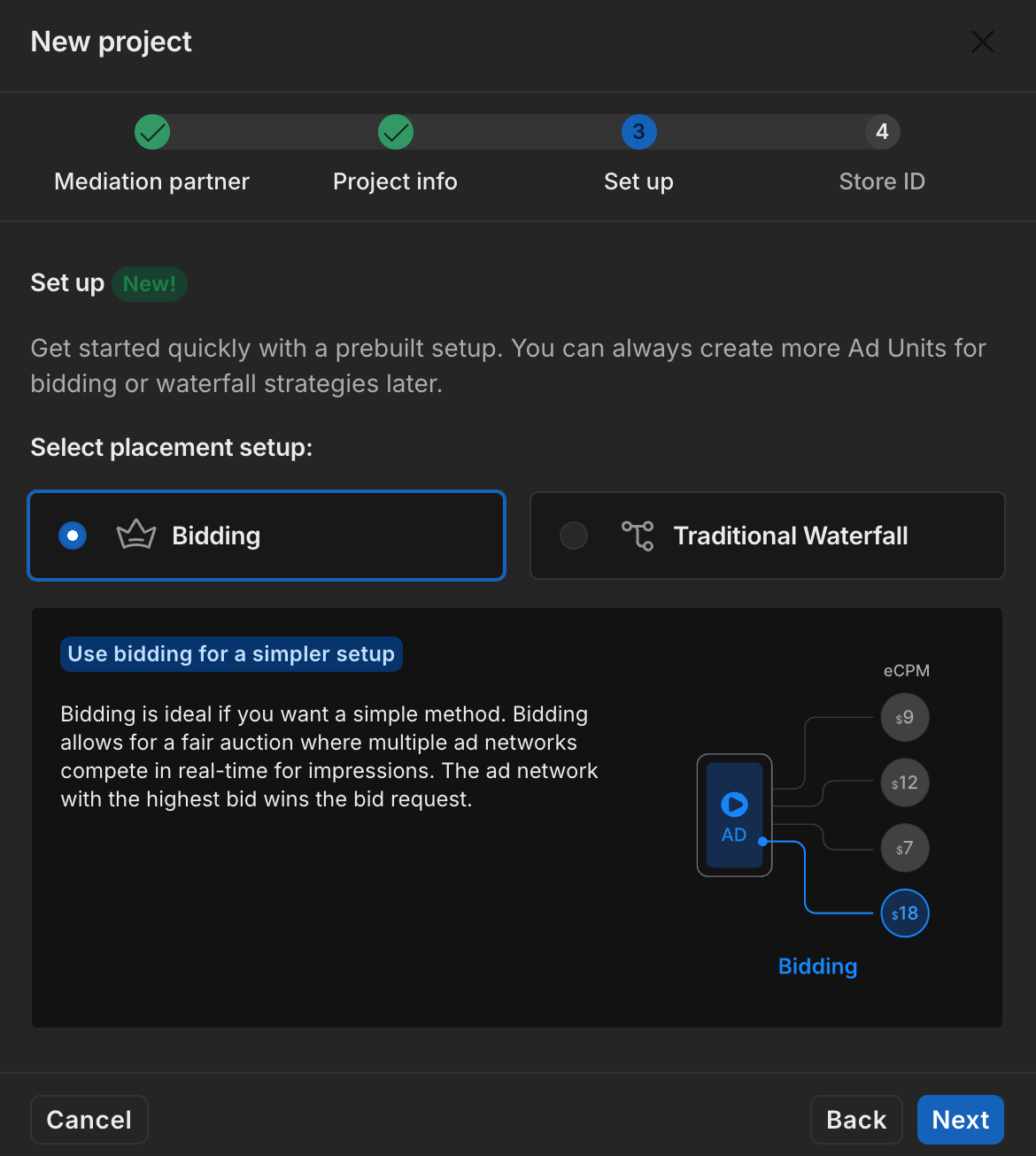
Wodospad
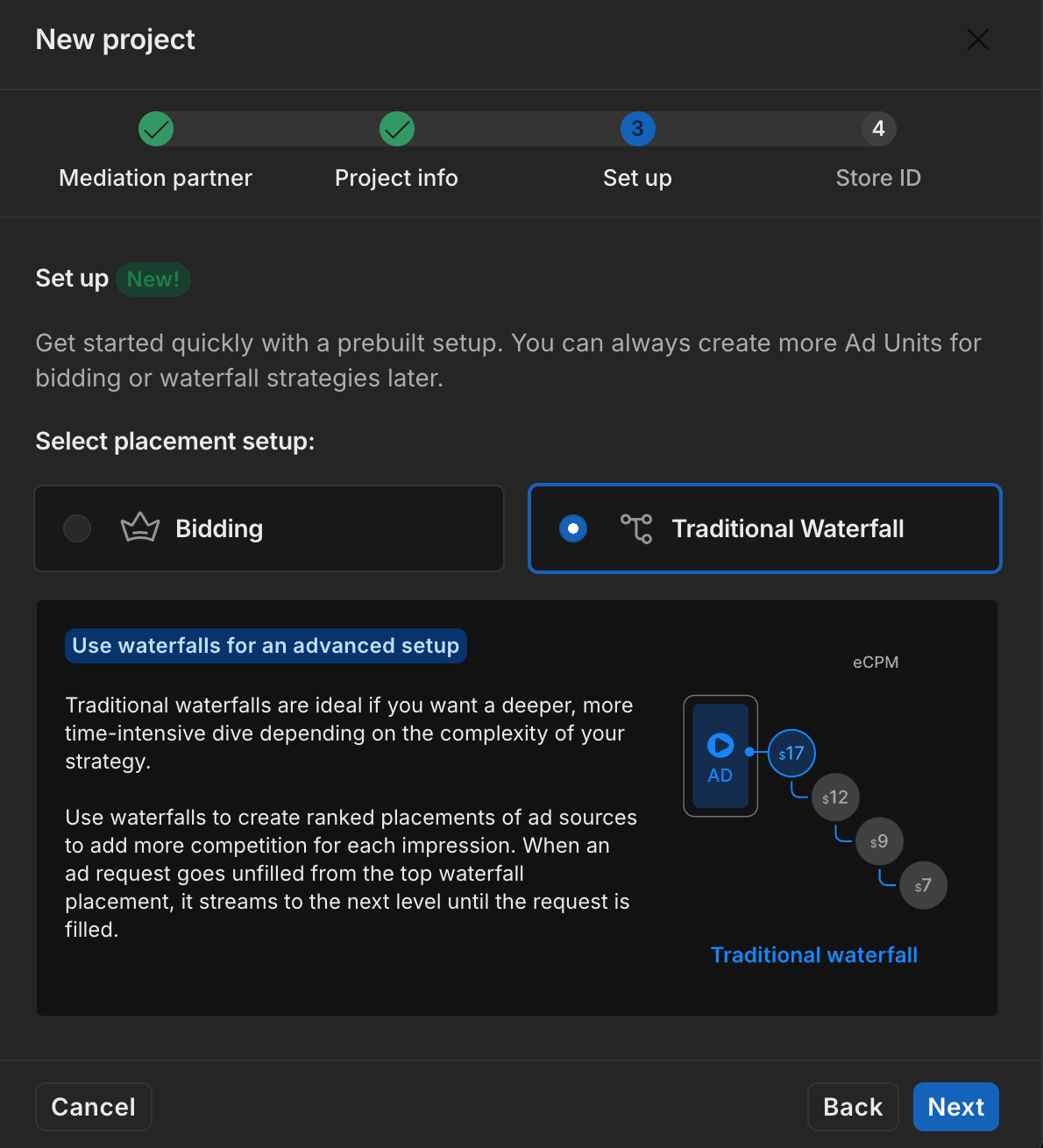
Wypełnij formularz i kliknij Dodaj projekt.
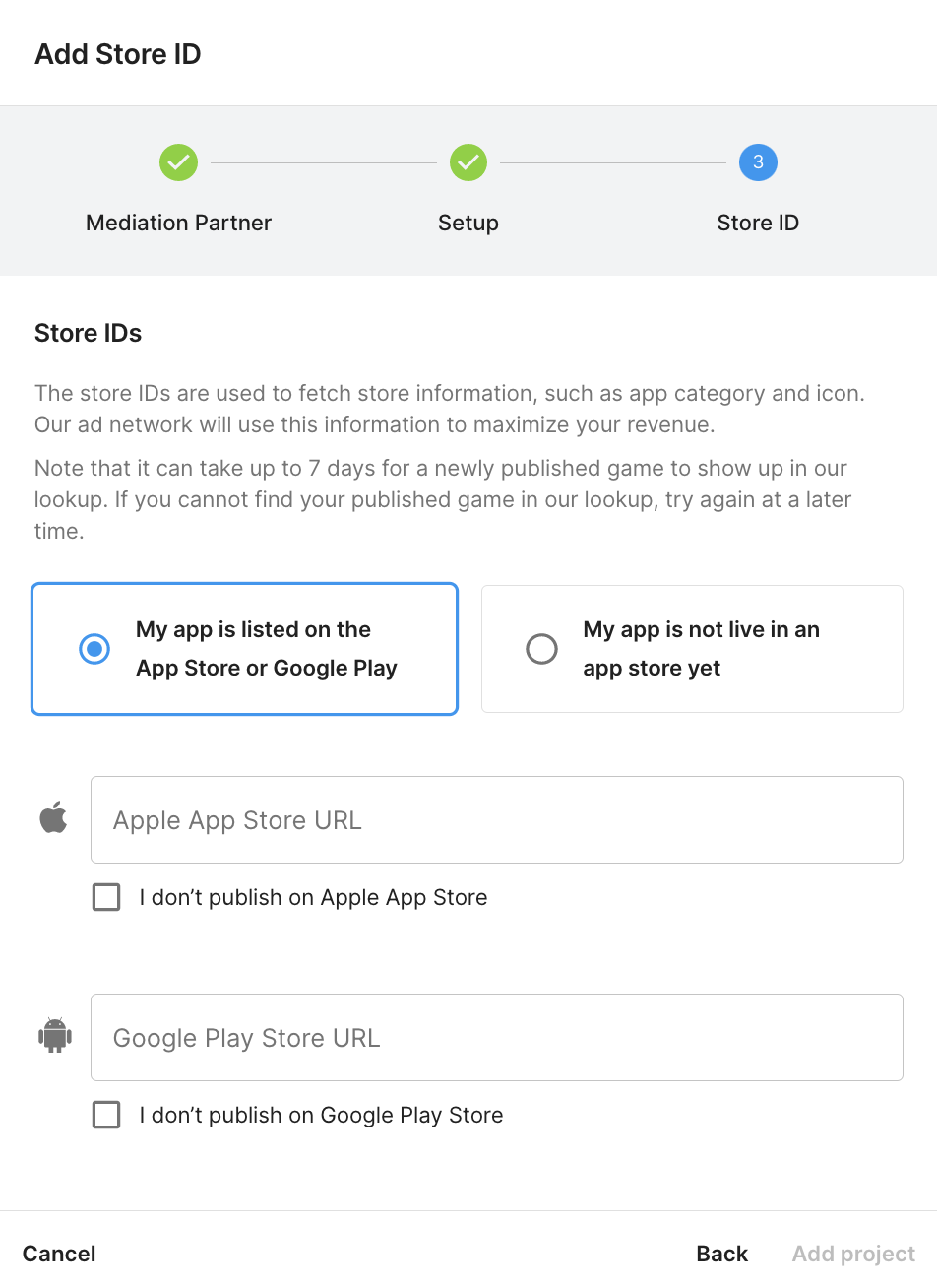
Zanotuj identyfikator gry.
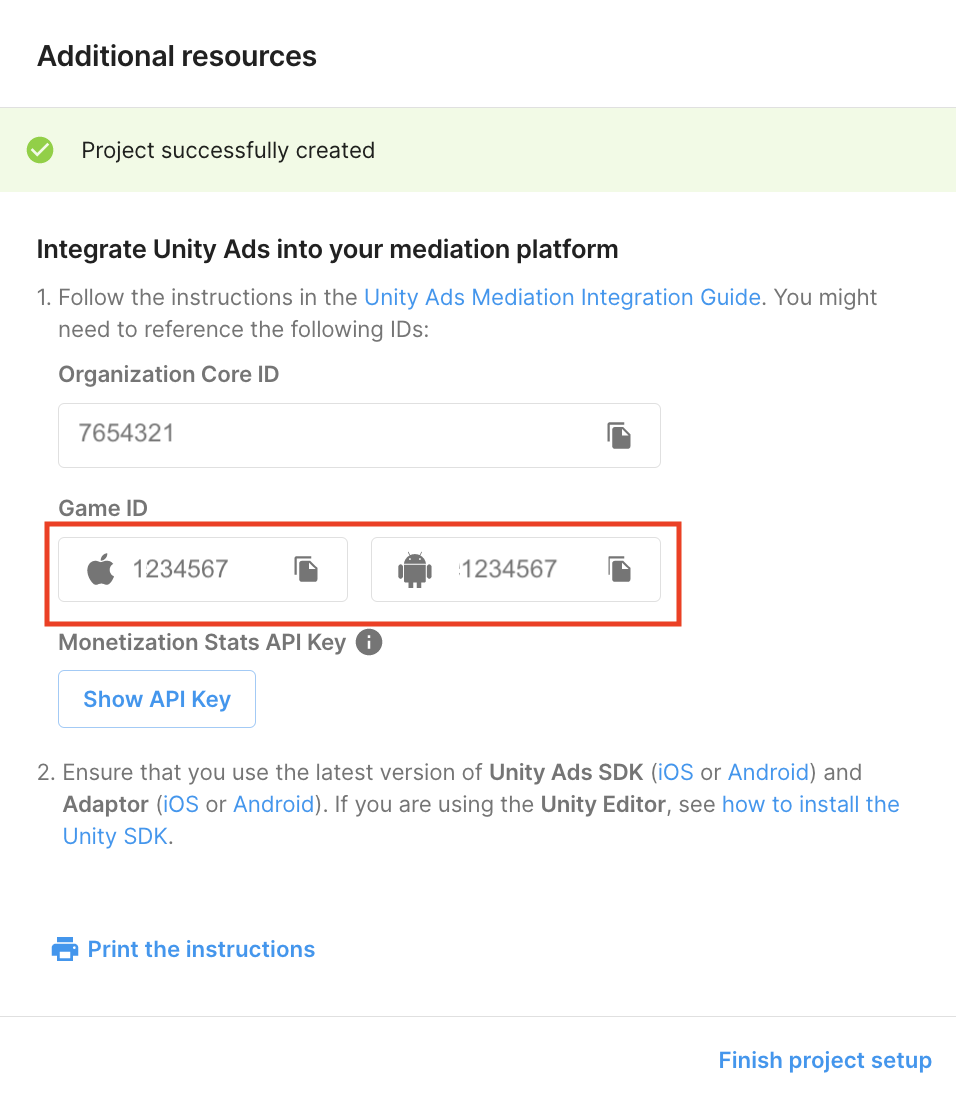
Tworzenie jednostek reklamowych i miejsc docelowych
Kliknij kolejno Zarabianie na reklamach Unity > Miejsca docelowe, a następnie wybierz projekt i kliknij Dodaj jednostkę reklamową.
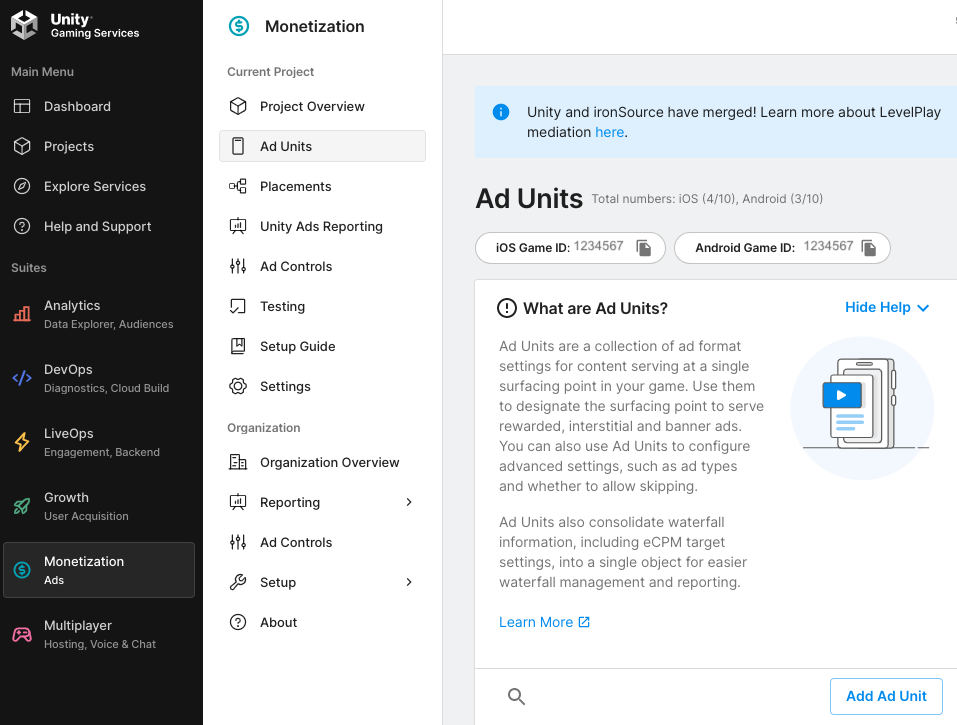
Wpisz nazwę jednostki reklamowej, a potem wybierz platformę i format reklamy.

Określanie stawek
W sekcji Konfiguracja wybierz Określanie stawek. W sekcji Miejsce docelowe wpisz nazwę miejsca docelowego.
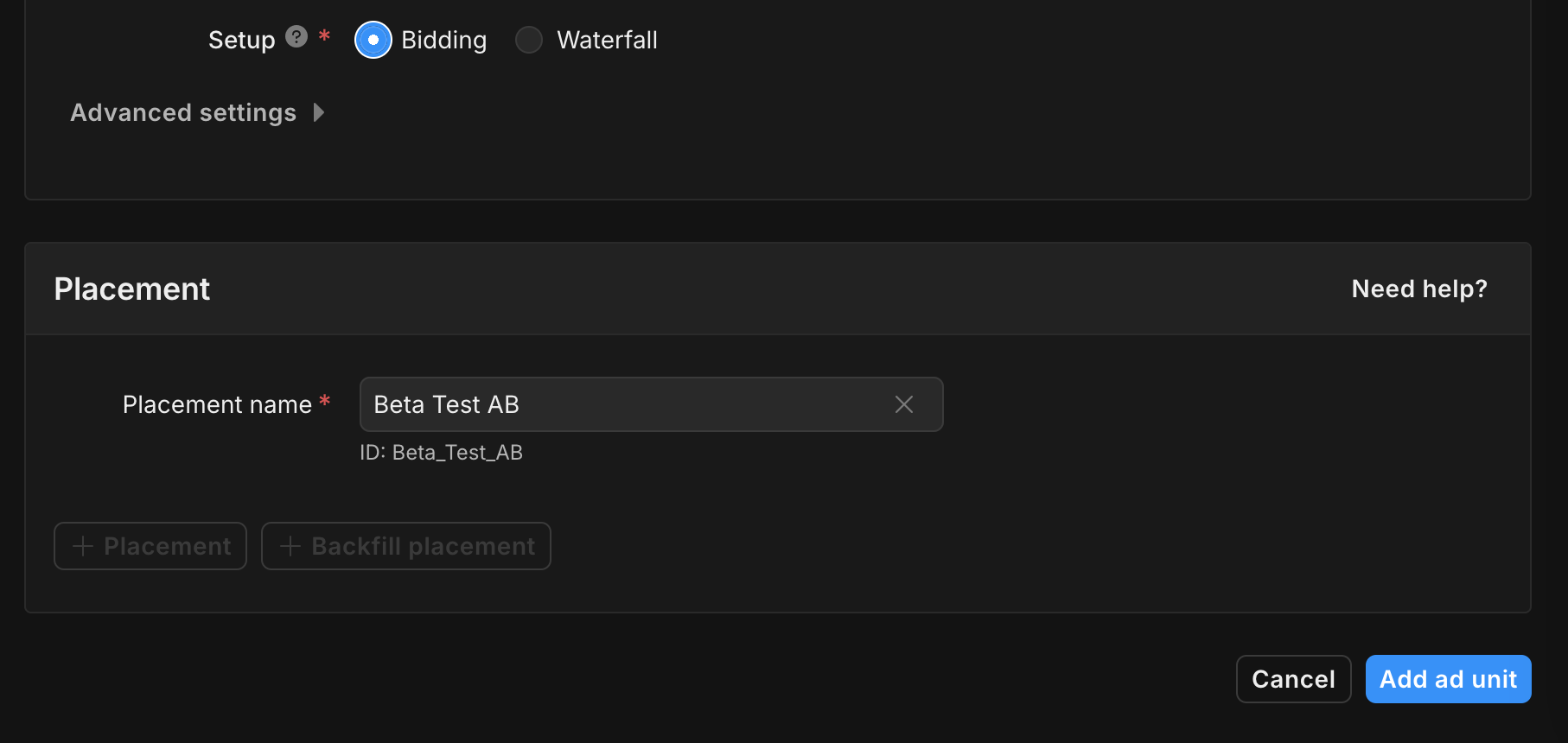
Zapisz identyfikator miejsca docelowego.
Wodospad
W sekcji Konfiguracja wybierz Kaskada. W sekcji Miejsce docelowe wpisz nazwę miejsca docelowego, tagowanie geograficzne i kierowanie.
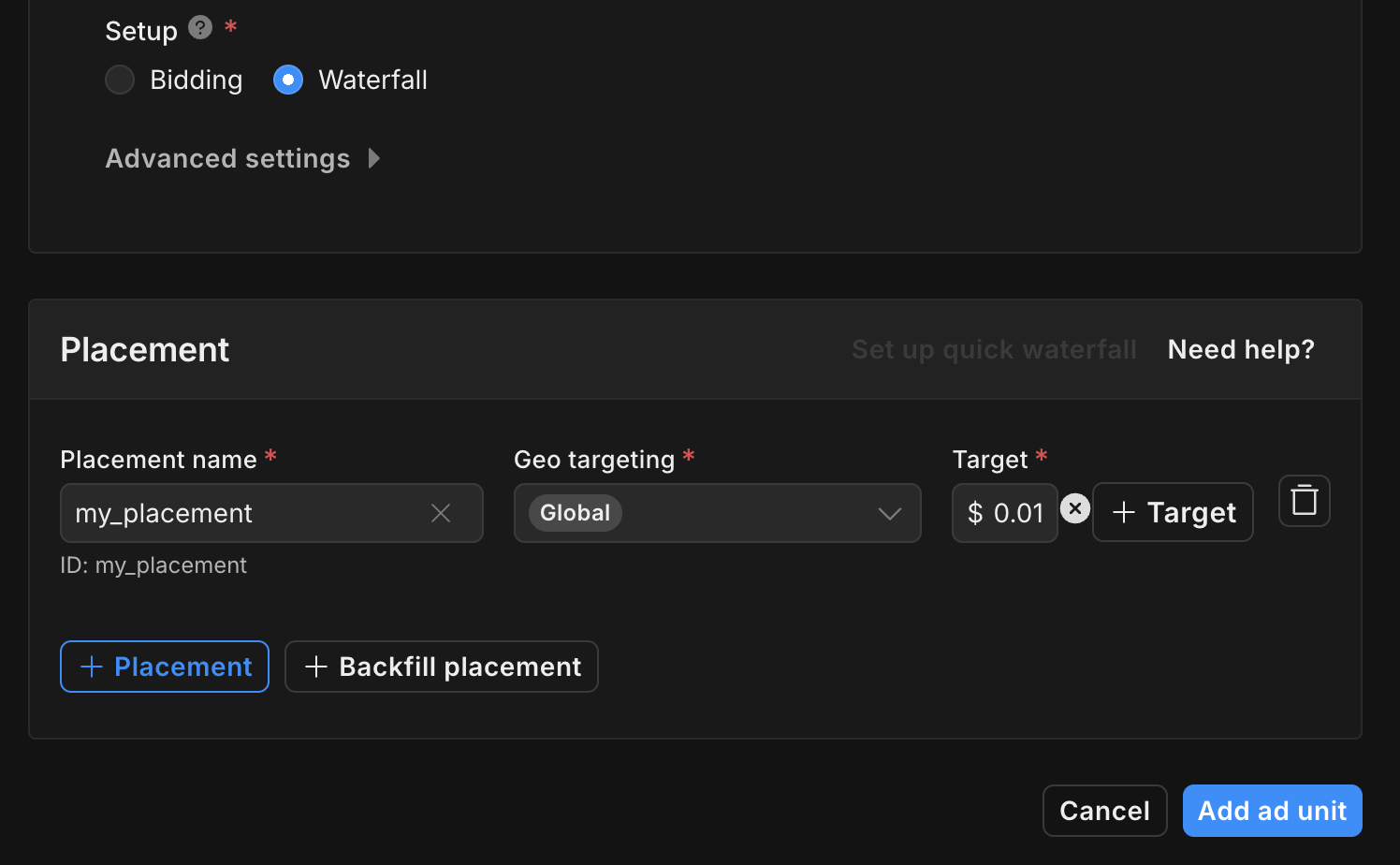
Zapisz identyfikator miejsca docelowego.
Na koniec kliknij Dodaj jednostkę reklamową, aby zapisać jednostkę reklamową i miejsce docelowe.
Znajdowanie klucza interfejsu Unity Ads Reporting API
Określanie stawek
Ten krok nie jest wymagany w przypadku integracji z określaniem stawek.
Wodospad
Otwórz Unity Ads Monetization > API management i zanotuj klucz interfejsu API w sekcji Dostęp do interfejsu API statystyk zarabiania.
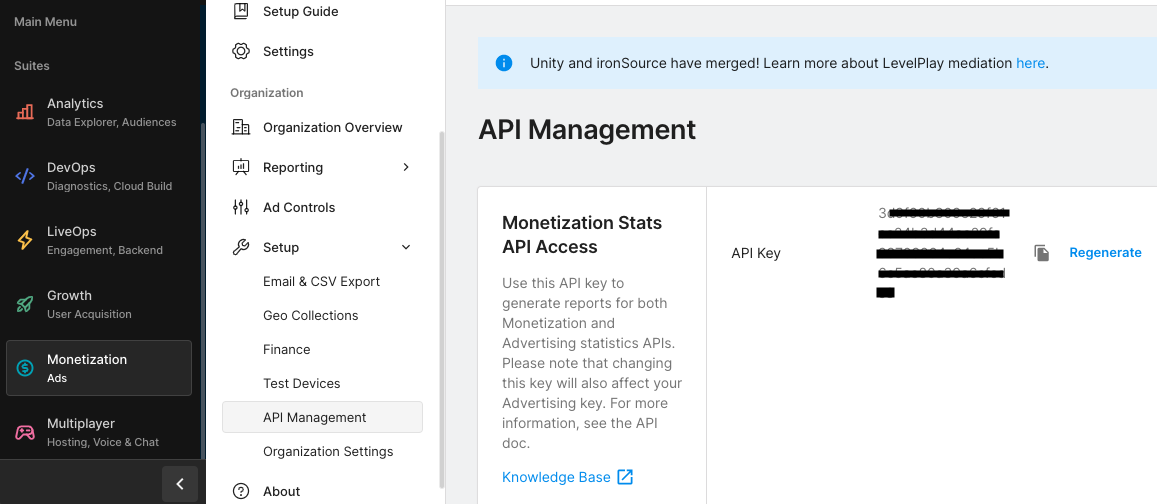
Następnie kliknij Zarabianie na reklamach Unity > Ustawienia organizacji i zanotuj główny identyfikator organizacji.
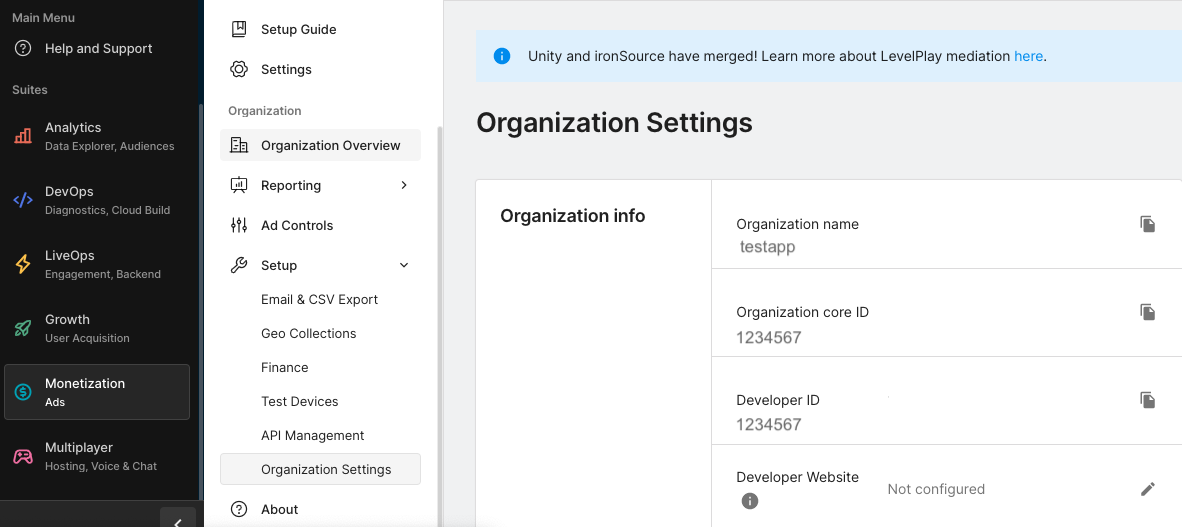
Aktualizowanie pliku app-ads.txt
Authorized Sellers for Apps (plik app-ads.txt) to projekt IAB Tech Lab, który ma zagwarantować, że Twoje zasoby reklamowe w aplikacjach będą sprzedawane tylko w tych kanałach, na które wyrażasz zgodę. Aby zapobiec znacznej utracie przychodów z reklam, musisz wdrożyć plik app-ads.txt.
Jeśli nie zostało to jeszcze zrobione, skonfiguruj plik app-ads.txt pod kątem aplikacji.
Aby wdrożyć app-ads.txt w przypadku reklam Unity Ads, zapoznaj się z informacjami o pierwszej konfiguracji pliku app-ads.txt.
Włączanie trybu testowego
Tryb testowy można włączyć w panelu Unity Ads. Kliknij Unity Ads Monetization (Generowanie przychodu z reklam Unity) > Testing (Testowanie).
Aby wymusić tryb testowy w aplikacji, kliknij przycisk edycji obok pozycji Apple App Store, włącz opcję Zastąp tryb testowy klienta i wybierz Wymuś tryb testowy (czyli używaj reklam testowych) na wszystkich urządzeniach.

Możesz też włączyć tryb testowy na określonych urządzeniach, klikając Dodaj urządzenie testowe.
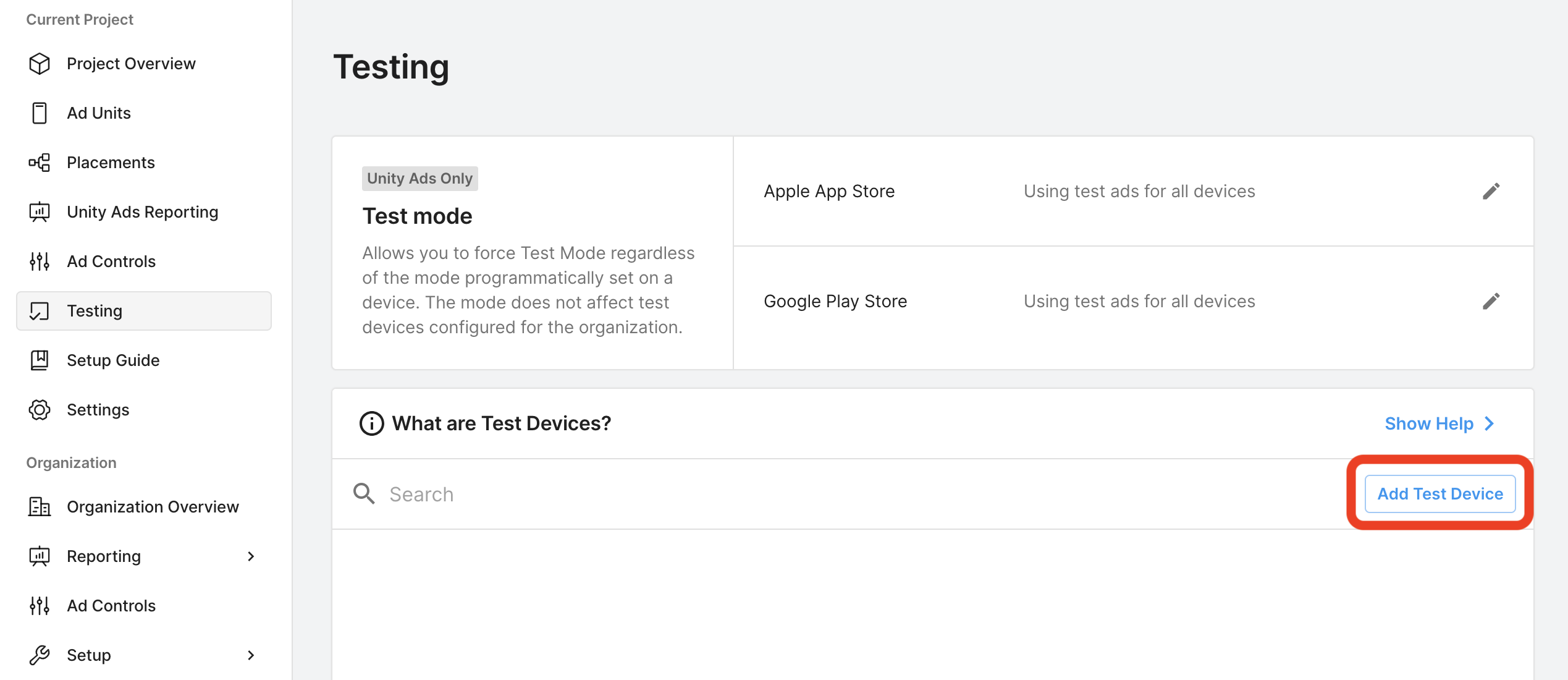
Wpisz szczegóły urządzenia testowego i kliknij Zapisz.
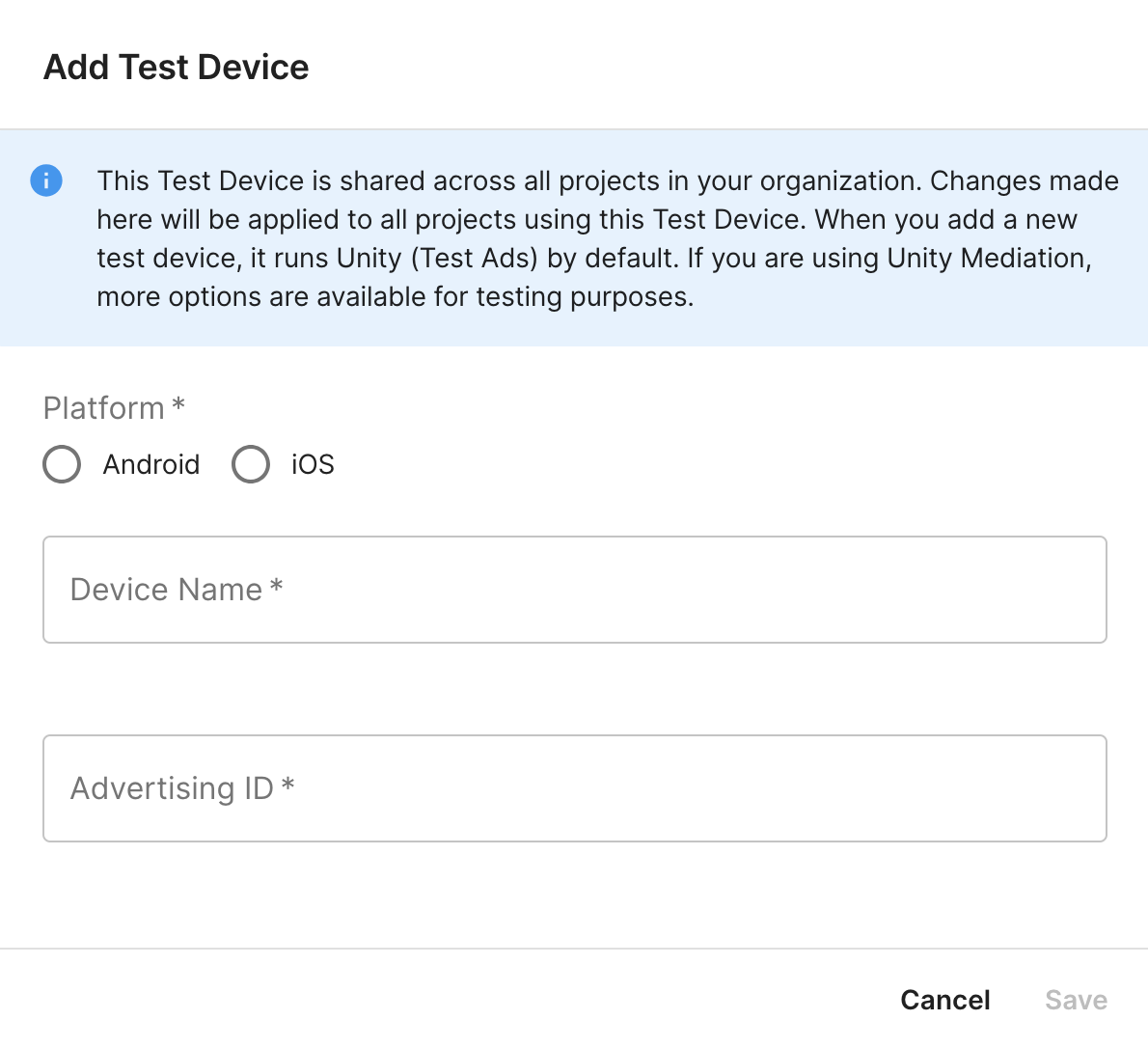
Krok 2. Skonfiguruj popyt Unity Ads w interfejsie AdMob
Konfigurowanie ustawień zapośredniczenia dla jednostki reklamowej
Musisz dodać Unity Ads do konfiguracji zapośredniczenia dla swojej jednostki reklamowej.
Najpierw zaloguj się na konto AdMob. Następnie otwórz kartę Mediacja. Jeśli masz już grupę zapośredniczenia, którą chcesz zmodyfikować, kliknij jej nazwę, aby ją edytować, i przejdź do sekcji Dodawanie Unity Ads jako źródła reklam.
Aby utworzyć nową grupę zapośredniczenia, kliknij Utwórz grupę zapośredniczenia.
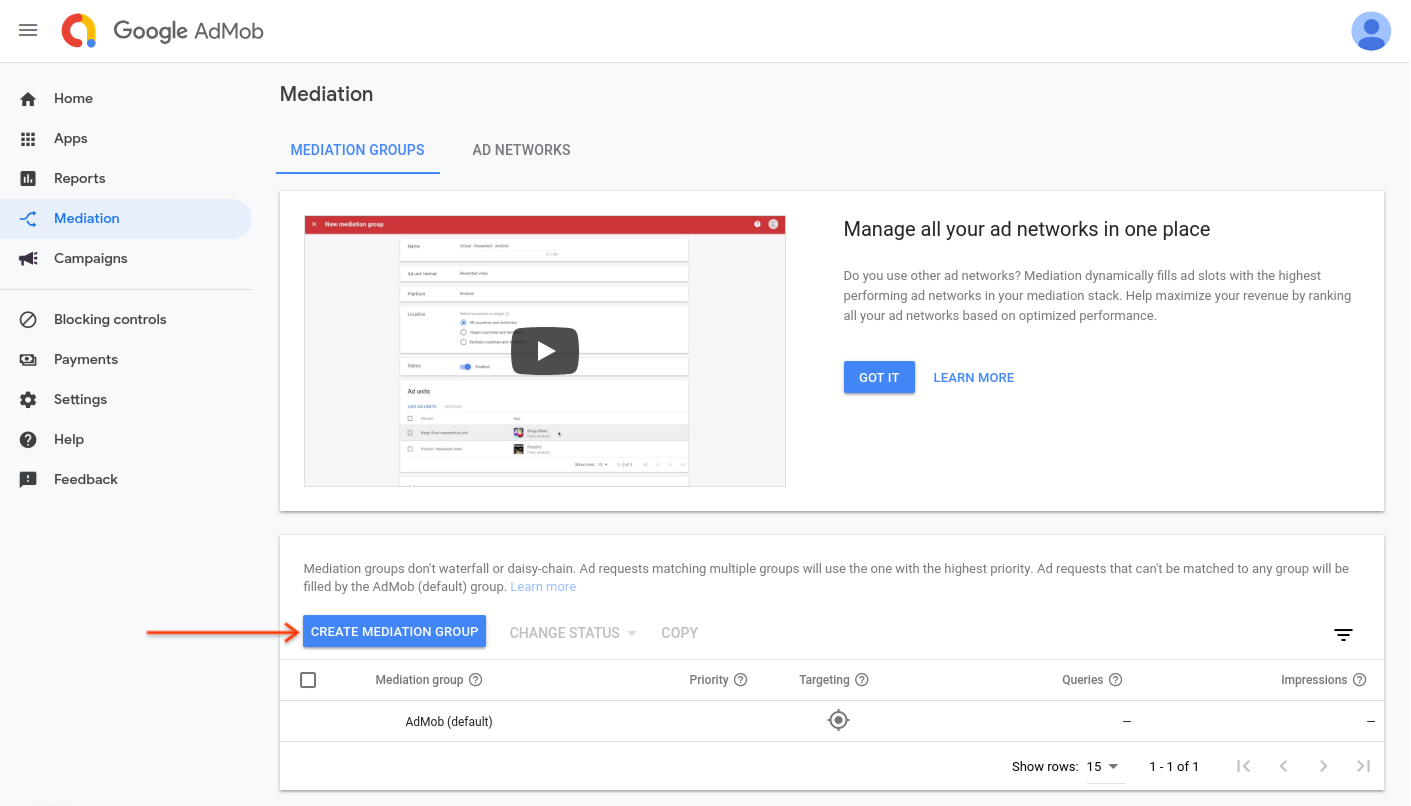
Wpisz format reklamy i platformę, a potem kliknij Dalej.
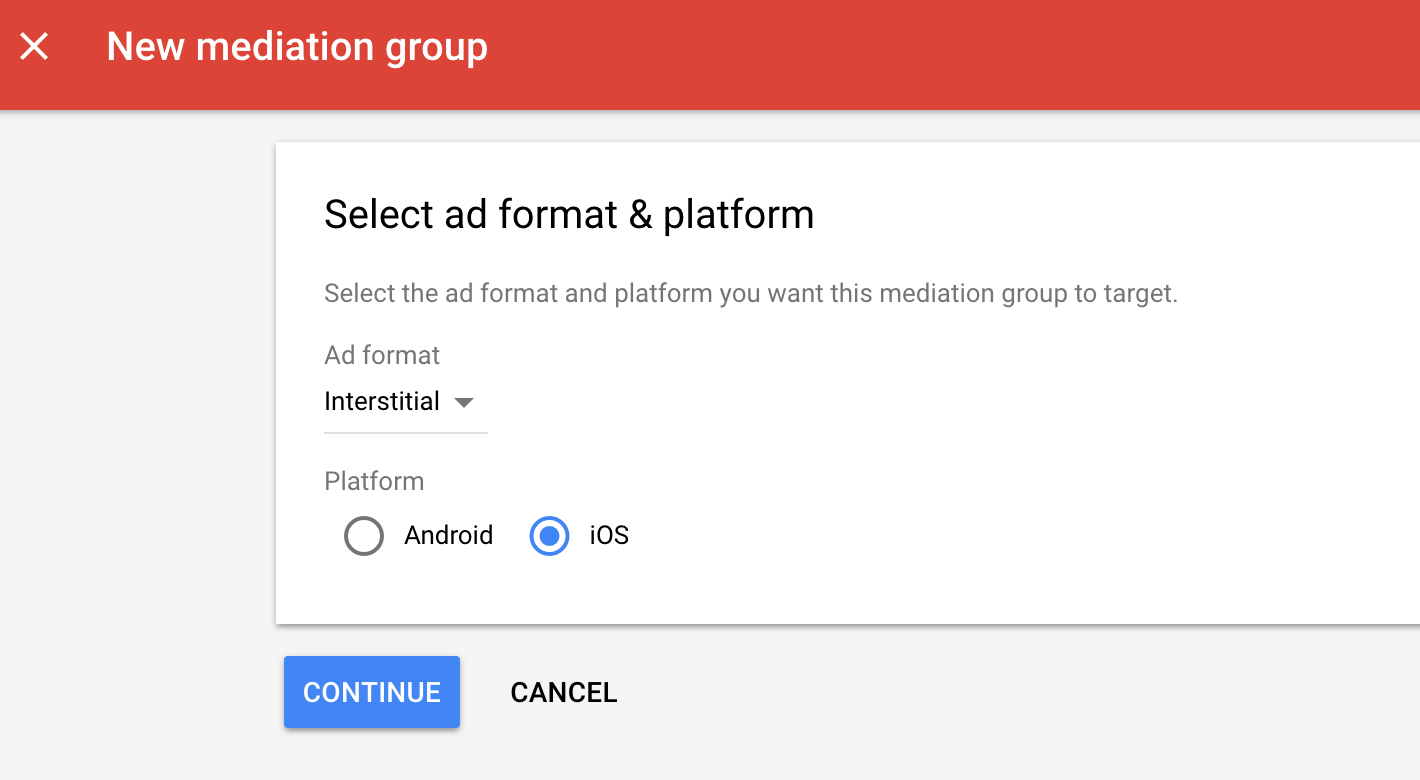
Nadaj grupie zapośredniczenia nazwę i wybierz lokalizacje, na które chcesz kierować reklamy. Następnie ustaw stan grupy mediacyjnej na Włączona i kliknij Dodaj jednostki reklamowe.
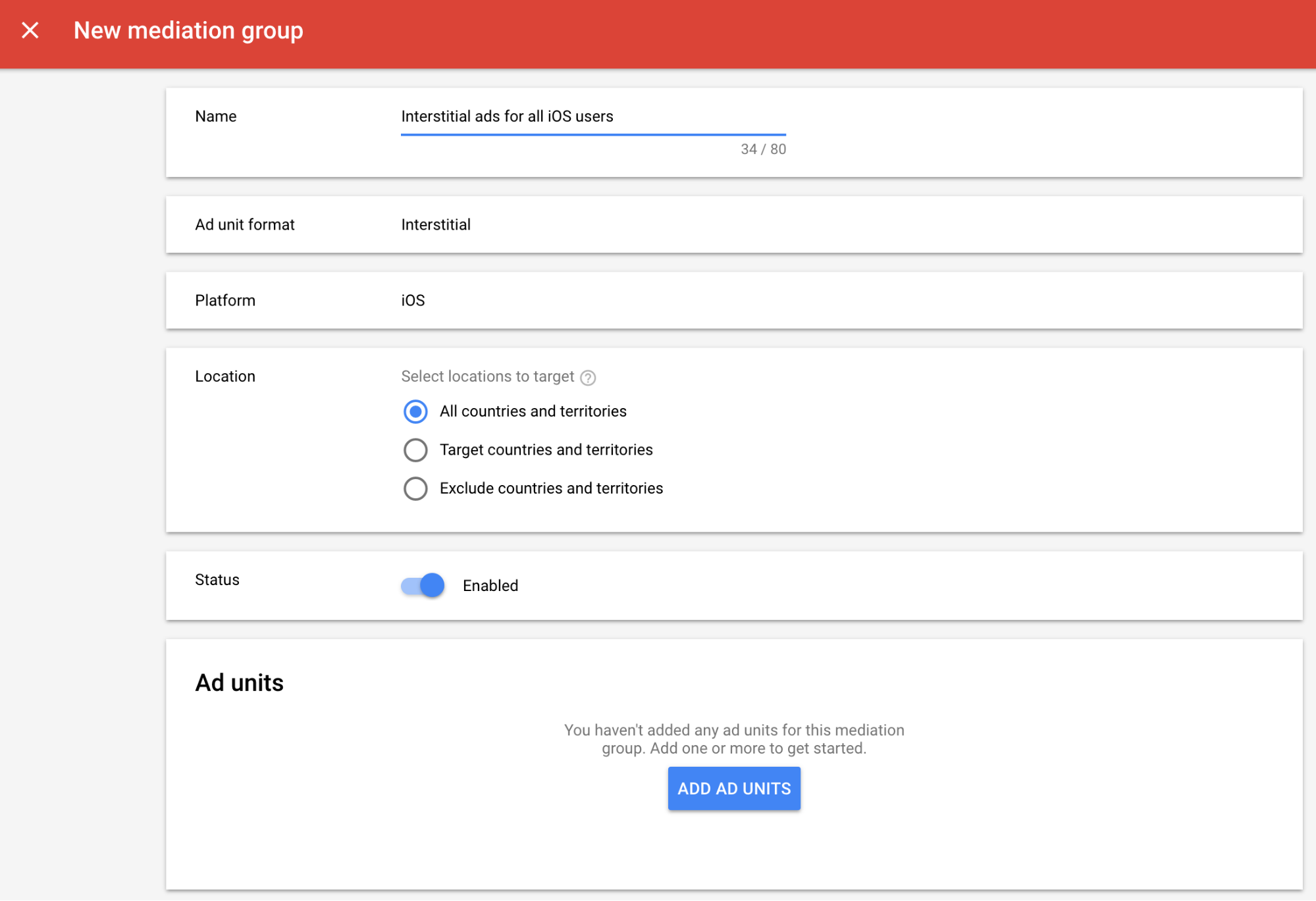
Powiąż tę grupę zapośredniczenia z co najmniej jedną z dotychczasowych jednostek reklamowych AdMob. Następnie kliknij Gotowe.
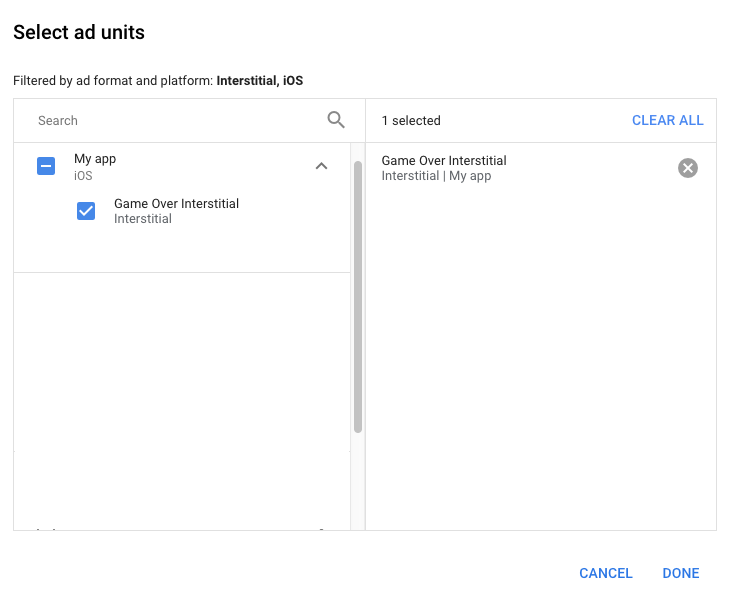
Na karcie jednostek reklamowych powinny się teraz wyświetlać wybrane przez Ciebie jednostki:
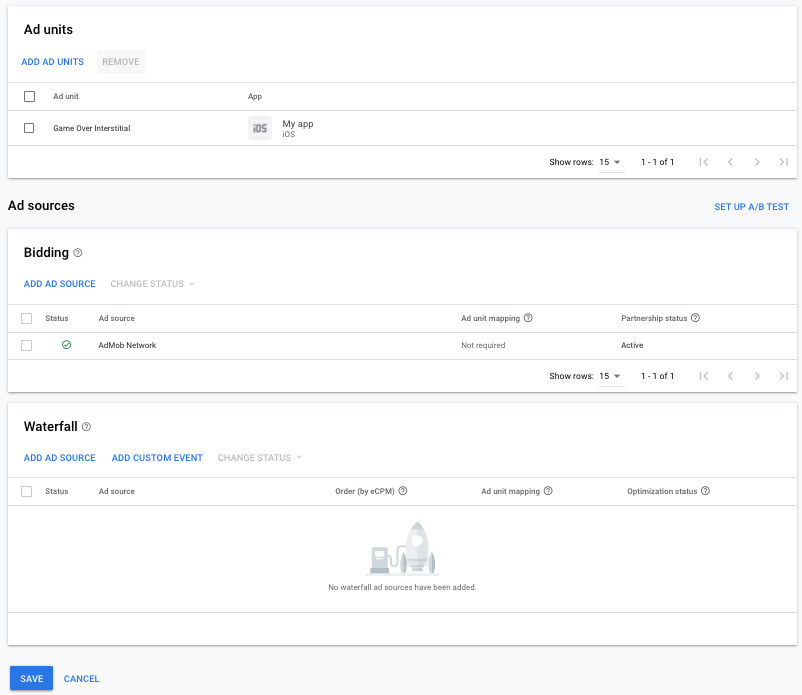
Dodawanie Unity Ads jako źródła reklam
Określanie stawek
Na karcie Ustalanie stawek w sekcji Źródła reklam kliknij Dodaj źródło reklam. Następnie wybierz Unity Ads.Kliknij Jak podpisać umowę partnerską i skonfiguruj partnerstwo w zakresie określania stawek z Unity Ads.
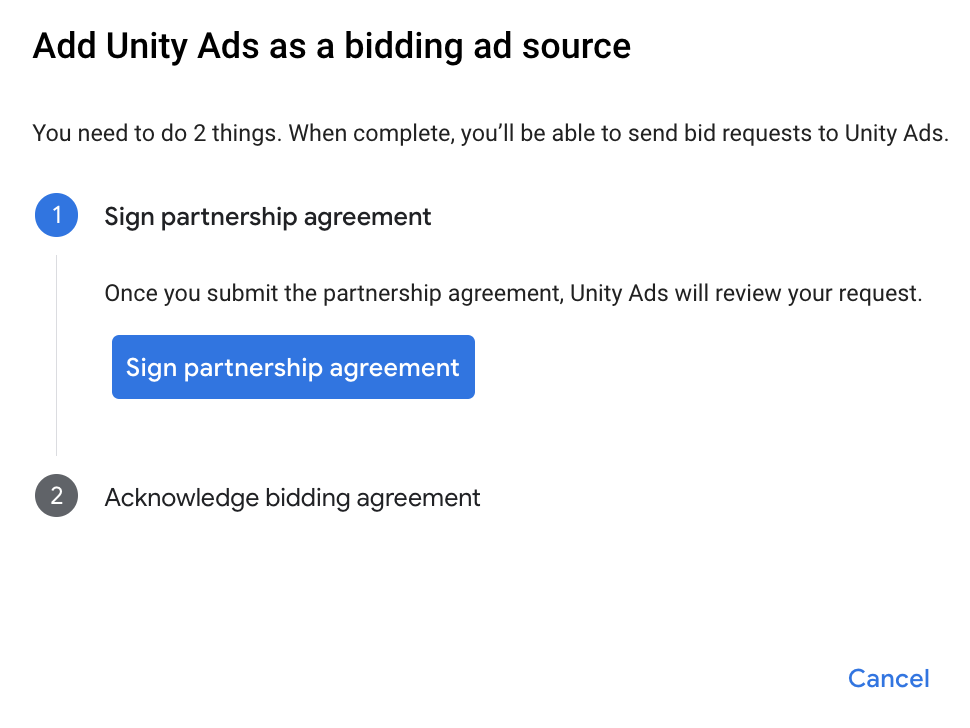
Kliknij Potwierdzam i wyrażam zgodę, a potem Dalej.
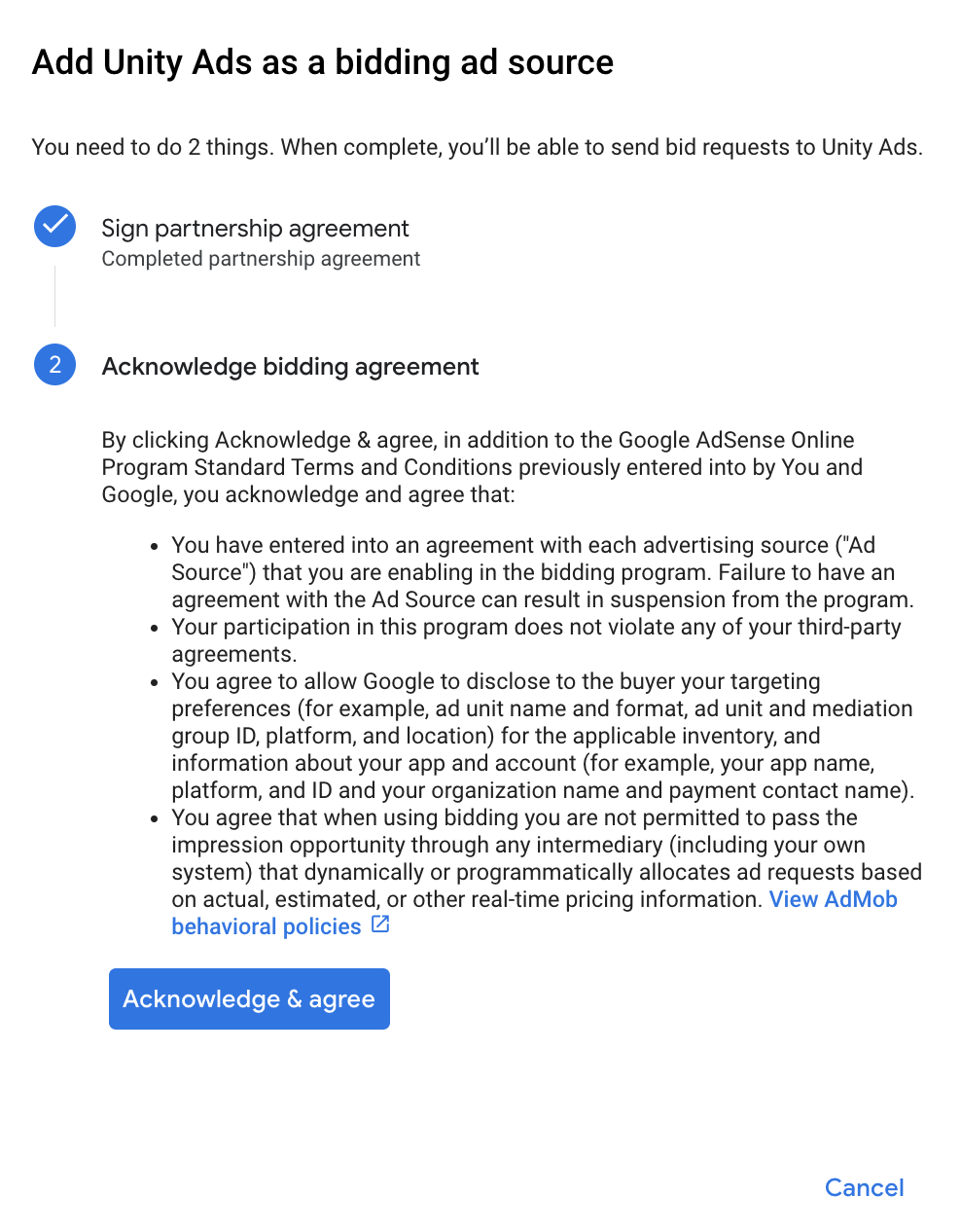
Jeśli masz już mapowanie na potrzeby Unity Ads, możesz je wybrać. W przeciwnym razie kliknij Dodaj mapowanie.
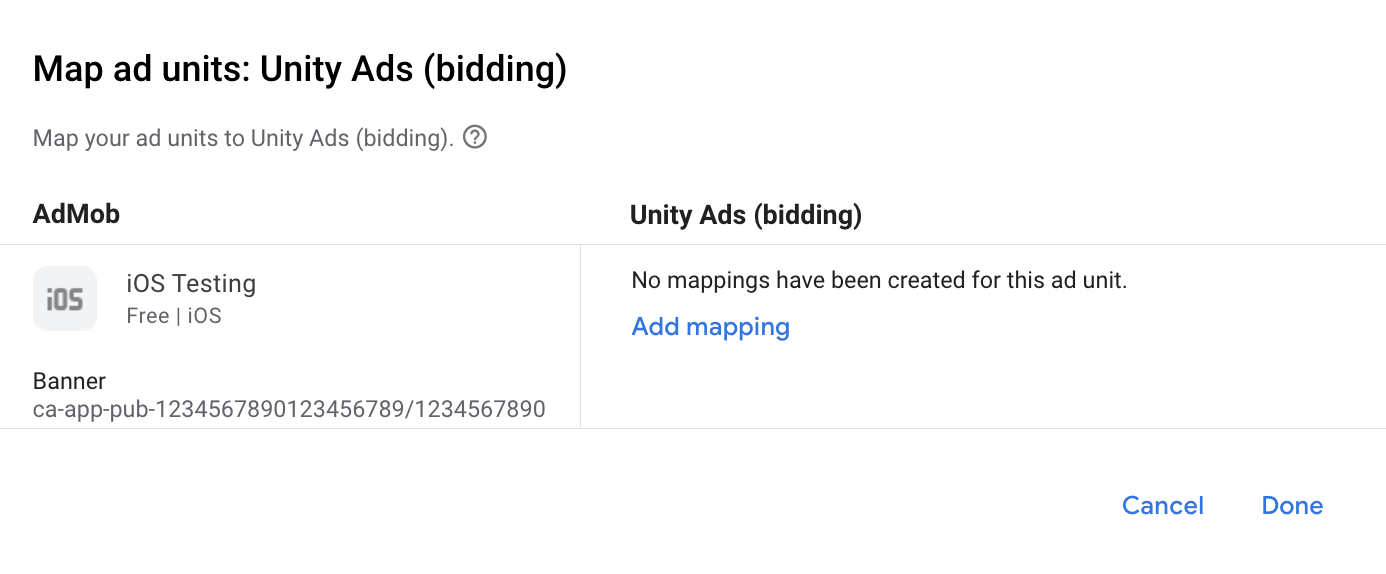
Następnie wpisz identyfikator gry i identyfikator miejsca docelowego uzyskane w poprzedniej sekcji. Następnie kliknij Gotowe.
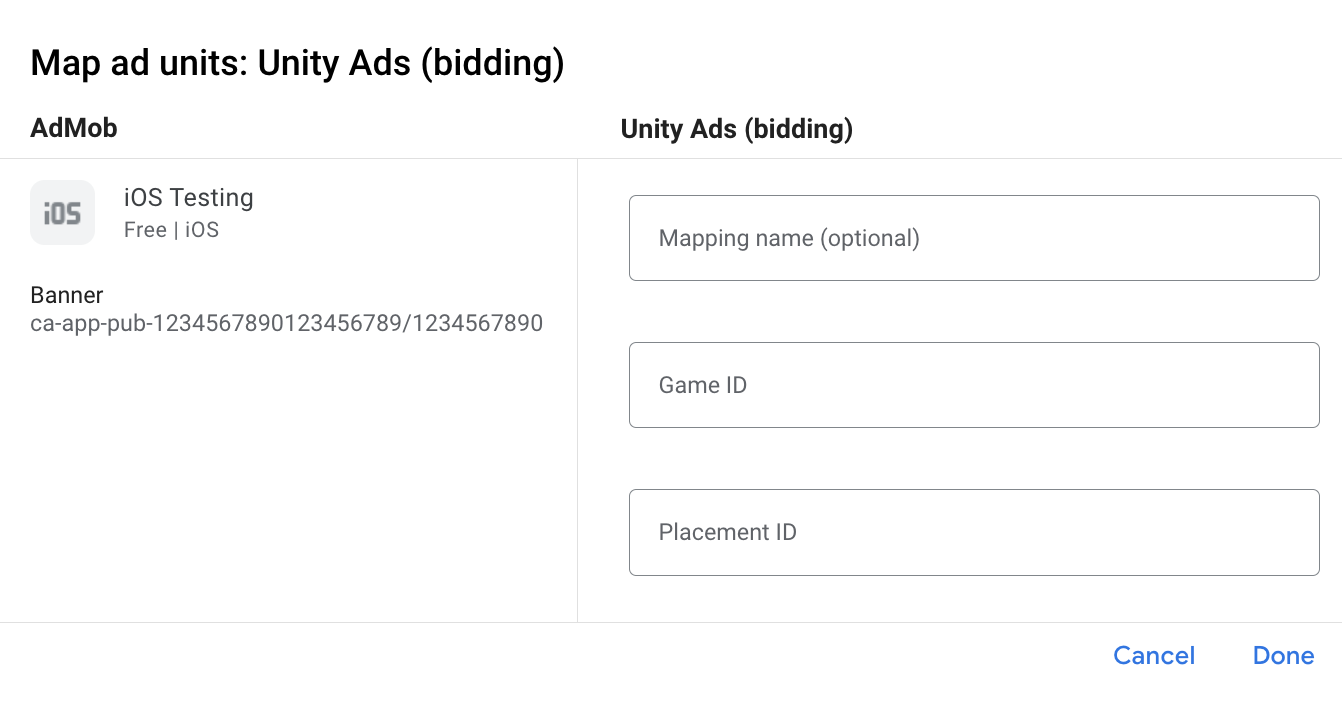
Wodospad
Na karcie Kaskada w sekcji Źródła reklam kliknij Dodaj źródło reklam.
Wybierz Unity Ads i włącz przełącznik Optymalizuj. Aby skonfigurować optymalizację źródła reklam w przypadku Unity Ads, wpisz klucz interfejsu API i podstawowy identyfikator organizacji uzyskane w poprzedniej sekcji. Następnie wpisz wartość eCPM w przypadku Unity Ads i kliknij Dalej.

Jeśli masz już mapowanie dla Unity Ads, możesz je wybrać. W przeciwnym razie kliknij Dodaj mapowanie.

Następnie wpisz identyfikator gry i identyfikator miejsca docelowego uzyskane w poprzedniej sekcji. Następnie kliknij Gotowe.

Dodawanie Unity Ads do listy partnerów reklamowych zachowujących zgodność z RODO i amerykańskimi przepisami stanowymi
Aby dodać Unity Ads do listy partnerów reklamowych zachowujących zgodność z rozporządzeniami europejskimi i amerykańskimi przepisami stanowymi w interfejsie AdMob, wykonaj czynności opisane w sekcjach Ustawienia dotyczące rozporządzeń europejskich i Ustawienia dotyczące amerykańskich przepisów stanowych.
Krok 3. Zaimportuj pakiet SDK Unity Ads i adapter
Używanie menedżera pakietów Swift
Zanim przejdziesz dalej, musisz mieć minimalną obsługiwaną wersję adaptera 4.16.0.0.
Aby dodać zależność pakietu do projektu, wykonaj te czynności:
W Xcode kliknij File > Add Package Dependencies... (Plik > Dodaj zależności pakietu…).
W wyświetlonym wierszu poleceń wyszukaj ten adres URL pakietu:
https://github.com/googleads/googleads-mobile-ios-mediation-unity.gitW sekcji Reguła zależności wybierz Rozgałęzienie.
W polu tekstowym wpisz
main.
Korzystanie z CocoaPods
Dodaj do pliku Podfile projektu ten wiersz:
pod 'GoogleMobileAdsMediationUnity'W wierszu poleceń uruchom:
pod install --repo-update
Integracja ręczna
Pobierz najnowszą wersję pakietu SDK Unity Ads i połącz UnityAds.framework w projekcie.
Pobierz najnowszą wersję adaptera Unity Ads, korzystając z linku do pobierania w dzienniku zmian, i połącz UnityAdapter.framework w projekcie.
Krok 4. Wdróż ustawienia prywatności w pakiecie SDK Unity Ads
Zgoda użytkowników z UE i RODO
Aby zachować zgodność z polityką Google w zakresie zgody użytkownika z UE, musisz przekazywać użytkownikom z Europejskiego Obszaru Gospodarczego (EOG), Wielkiej Brytanii i Szwajcarii określone informacje oraz uzyskiwać ich zgodę na stosowanie plików cookie lub innych środków do lokalnego przechowywania danych, jeśli jest to wymagane przez prawo, a także na zbieranie, udostępnianie i wykorzystywanie danych osobowych na potrzeby personalizacji reklam. Polityka ta odzwierciedla wymagania UE zawarte w dyrektywie o prywatności i łączności elektronicznej oraz w Ogólnym rozporządzeniu o ochronie danych (RODO). Odpowiadasz za sprawdzenie, czy zgoda jest przekazywana do każdego źródła reklam w łańcuchu mediacji. Google nie może automatycznie przekazywać do takich sieci wyboru użytkownika dotyczącego zgody.
W wersji 2.0.0 pakietu SDK Unity Ads dodaliśmy interfejs API obsługujący ustawienia prywatności. Poniższy przykładowy kod pokazuje, jak przekazywać te informacje o stanie zgody do pakietu Unity Ads SDK. Jeśli zdecydujesz się ręcznie przekazywać informacje o zgodzie do pakietu Unity Ads SDK, zalecamy wywoływanie tego kodu przed wysłaniem żądania wyświetlenia reklam za pomocą funkcji Google Mobile Ads SDK.
Swift
import UnityAds
// ...
let gdprMetaData = UADSMetaData()
gdprMetaData.set("gdpr.consent", value: true)
gdprMetaData.commit()
Objective-C
#import <UnityAds/UnityAds.h>
// ...
UADSMetaData *gdprMetaData = [[UADSMetaData alloc] init];
[gdprMetaData set:@"gdpr.consent" value:@YES];
[gdprMetaData commit];
Więcej informacji i wartości, które można podać w każdej metodzie, znajdziesz w artykule Zgodność reklam Unity z GDPR.
amerykańskie przepisy stanowe o ochronie prywatności,
Przepisy dotyczące prywatności w stanach USA wymagają, aby użytkownicy mieli możliwość wycofania zgody na „sprzedaż” „danych osobowych” (w znaczeniu określonym w ustawie). Wycofanie zgody musi być możliwe za pomocą dobrze widocznego linku „Do Not Sell My Personal Information” („Nie sprzedawaj moich danych osobowych”) na stronie głównej podmiotu „sprzedającego”. Przewodnik po zgodności z przepisami stanów USA dotyczącymi ochrony prywatności umożliwia włączenie ograniczonego przetwarzania danych na potrzeby wyświetlania reklam Google, ale Google nie może zastosować tego ustawienia do każdej sieci reklamowej w Twoim łańcuchu mediacji. Dlatego musisz wskazać każdą sieć reklamową w łańcuchu zapośredniczenia, która może uczestniczyć w sprzedaży danych osobowych, i postępować zgodnie z wytycznymi każdej z tych sieci, aby zapewnić zgodność z przepisami.
W wersji 2.0.0 pakietu SDK Unity Ads dodaliśmy interfejs API obsługujący ustawienia prywatności. Poniższy przykładowy kod pokazuje, jak przekazywać te informacje o stanie zgody do pakietu Unity Ads SDK. Jeśli zdecydujesz się ręcznie przekazywać informacje o zgodzie do pakietu Unity Ads SDK, zalecamy wywoływanie tego kodu przed wysłaniem żądania wyświetlenia reklam za pomocą funkcji Google Mobile Ads SDK.
Swift
import UnityAds
// ...
let ccpaMetaData = UADSMetaData()
ccpaMetaData.set("privacy.consent", value: true)
ccpaMetaData.commit()
Objective-C
#import <UnityAds/UnityAds.h>
// ...
UADSMetaData *ccpaMetaData = [[UADSMetaData alloc] init];
[ccpaMetaData set:@"privacy.consent" value:@YES];
[ccpaMetaData commit];
Więcej informacji i wartości, które można podać w każdej metodzie, znajdziesz w artykule Unity Ads na temat zgodności z ustawą o ochronie prywatności konsumentów.
Krok 5. Dodaj wymagany kod
Integracja SKAdNetwork
Postępuj zgodnie z dokumentacją Unity Ads, aby dodać identyfikatory SKAdNetwork do pliku Info.plist projektu.
Błędy kompilacji
Swift
Integracje Swift nie wymagają dodatkowego kodu.
Objective-C
W przypadku adaptera Unity Ads w wersji 4.4.0.0 lub nowszej musisz postępować zgodnie z instrukcjami integracji podanymi w dokumentacji Unity.
Krok 6. Przetestuj implementację
Włączanie reklam testowych
Upewnij się, że zarejestrowano urządzenie testowe w AdMob i włączono tryb testowy w interfejsie Unity Ads.
Weryfikowanie reklam testowych
Aby sprawdzić, czy otrzymujesz reklamy testowe z Unity Ads, włącz testowanie pojedynczego źródła reklam w inspektorze reklam, korzystając ze źródeł reklam Unity Ads (określanie stawek) i Unity Ads (kaskadowe).
Kody błędów
Jeśli adapter nie otrzyma reklamy z Unity Ads, wydawcy mogą sprawdzić podstawowy błąd w odpowiedzi na reklamę za pomocą GADResponseInfo.adNetworkInfoArray w tych klasach:
GADMAdapterUnity
GADMediationAdapterUnity
Oto kody i komunikaty towarzyszące, które są zwracane przez adapter UnityAds, gdy nie uda się wczytać reklamy:
| Kod błędu | Przyczyna |
|---|---|
| 0-9 | Pakiet UnityAds SDK zwrócił błąd. Więcej informacji znajdziesz w dokumentacji Unity. |
| 101 | Parametry serwera UnityAds skonfigurowane w interfejsie AdMob są nieprawidłowe lub ich brakuje. |
| 102 | Urządzenie nie jest obsługiwane przez UnityAds. |
| 103 | Wyświetlanie reklamy UnityAds zostało zakończone z błędem kUnityAdsFinishStateError. |
| 104 | Po wywołaniu inicjatora obiektu reklamy Unity jest on pusty. |
| 105 | Nie udało się wyświetlić reklam Unity Ads, ponieważ reklama nie była gotowa. |
| 107 | UnityAds wywołało wywołanie zwrotne zmiany miejsca docelowego ze stanem miejsca docelowego kUnityAdsPlacementStateDisabled. |
| 108 | W tym miejscu docelowym reklama została już wczytana. Pakiet SDK UnityAds nie obsługuje wczytywania wielu reklam w tym samym miejscu docelowym. |
| 109 | Baner reklamowy zwrócony przez UnityAds nie pasuje do żądanego rozmiaru. |
| 110 | UnityAds zwróciło błąd inicjalizacji. |
| 111 | Nieobsługiwany format reklamy. |
Dziennik zmian adaptera do zapośredniczenia Unity Ads na iOS
Wersja 4.16.5.0
- Sprawdzona zgodność z pakietem Unity Ads SDK w wersji 4.16.5.
Zaprojektowano i przetestowano z użyciem:
- Pakiet SDK do reklam mobilnych Google w wersji 12.14.0.
- Wersja pakietu Unity Ads SDK 4.16.5.
Wersja 4.16.4.0
- Sprawdzona zgodność z pakietem Unity Ads SDK w wersji 4.16.4.
Zaprojektowano i przetestowano z użyciem:
- Pakiet SDK do reklam mobilnych Google w wersji 12.13.0.
- Unity Ads SDK w wersji 4.16.4.
Wersja 4.16.3.0
- Zweryfikowana zgodność z pakietem SDK Unity Ads w wersji 4.16.3.
Zaprojektowano i przetestowano z użyciem:
- Pakiet SDK do reklam mobilnych Google w wersji 12.12.0.
- Wersja pakietu Unity Ads SDK 4.16.3.
Wersja 4.16.2.0
- Zaktualizowano metody wczytywania reklam, aby przed próbą wczytania reklamy czekały na pełną inicjację pakietu SDK Unity Ads.
- Rozwiązaliśmy problem z wyścigiem, który mógł powodować pomijanie wywołań zwrotnych po zakończeniu, jeśli trwało wiele inicjacji.
- Sprawdzona zgodność z pakietem Unity Ads SDK w wersji 4.16.2.
Zaprojektowano i przetestowano z użyciem:
- Pakiet SDK do reklam mobilnych Google w wersji 12.12.0.
- Wersja pakietu Unity Ads SDK 4.16.2.
Wersja 4.16.1.0
- Sprawdzona zgodność z pakietem Unity Ads SDK w wersji 4.16.1.
Zaprojektowano i przetestowano z użyciem:
- Pakiet SDK do reklam mobilnych Google w wersji 12.9.0.
- Wersja pakietu Unity Ads SDK 4.16.1.
Wersja 4.16.0.0
- Teraz wymaga minimalnej wersji iOS
13.0. - Sprawdzona zgodność z pakietem Unity Ads SDK w wersji 4.16.0.
Zaprojektowano i przetestowano z użyciem:
- Pakiet SDK do reklam mobilnych Google w wersji 12.8.0.
- Unity Ads SDK w wersji 4.16.0.
Wersja 4.15.1.0
- Sprawdzona zgodność z pakietem Unity Ads SDK w wersji 4.15.1.
Zaprojektowano i przetestowano z użyciem:
- SDK do reklam mobilnych Google w wersji 12.6.0.
- Wersja pakietu Unity Ads SDK 4.15.1.
Wersja 4.15.0.0
- Dodano kod błędu
111: Unsupported ad format. - Sprawdzona zgodność z pakietem Unity Ads SDK w wersji 4.15.0.
Zaprojektowano i przetestowano z użyciem:
- Pakiet SDK do reklam mobilnych Google w wersji 12.5.0.
- Unity Ads SDK w wersji 4.15.0.
Wersja 4.14.2.0
- Sprawdzona zgodność z pakietem Unity Ads SDK w wersji 4.14.2.
Zaprojektowano i przetestowano z użyciem:
- Pakiet SDK do reklam mobilnych Google w wersji 12.3.0.
- Wersja pakietu Unity Ads SDK 4.14.2.
Wersja 4.14.1.1
- W przypadku określania stawek adapter nie sprawdza już rozmiaru banera reklamowego.
- W przypadku kaskadowego wyświetlania reklam adapter sprawdza teraz, czy format obrazu wczytanego banera reklamowego Unity Ads jest zgodny z rozmiarem żądanego banera reklamowego.
Zaprojektowano i przetestowano z użyciem:
- Pakiet SDK do reklam mobilnych Google w wersji 12.2.0.
- Wersja pakietu Unity Ads SDK 4.14.1.
Wersja 4.14.1.0
- Sprawdzona zgodność z pakietem Unity Ads SDK w wersji 4.14.1.
Zaprojektowano i przetestowano z użyciem:
- Pakiet SDK do reklam mobilnych Google w wersji 12.2.0.
- Wersja pakietu Unity Ads SDK 4.14.1.
Wersja 4.14.0.0
- Włącz flagi
-fobjc-arci-fstack-protector-all. - Sprawdzona zgodność z pakietem SDK Unity Ads w wersji 4.14.0.
Zaprojektowano i przetestowano z użyciem:
- Pakiet SDK do reklam mobilnych Google w wersji 12.2.0.
- Unity Ads SDK w wersji 4.14.0.
Wersja 4.13.2.0
- Sprawdzona zgodność z pakietem Unity Ads SDK w wersji 4.13.2.
Zaprojektowano i przetestowano z użyciem:
- Pakiet SDK do reklam mobilnych Google w wersji 12.1.0.
- Wersja pakietu SDK Unity Ads 4.13.2.
Wersja 4.13.1.1
- Wymaga teraz pakietu SDK do reklam mobilnych Google w wersji 12.0.0 lub nowszej.
Zaprojektowano i przetestowano z użyciem:
- Pakiet SDK do reklam mobilnych Google w wersji 12.0.0.
- Wersja pakietu SDK Unity Ads 4.13.1.
Wersja 4.13.1.0
- Dodaliśmy właściwość
GADMediationAdapterUnity.testMode, aby wskazać, czy pakiet SDK Unity Ads ma być inicjowany w trybie testowym. Ten flagę należy ustawić przed zainicjowaniem pakietu SDK do reklam mobilnych Google. - Zaktualizowano raportowanie kodu błędu pakietu SDK Unity Ads, gdy nie uda się wczytać reklamy.
Zaprojektowano i przetestowano z użyciem:
- Pakiet SDK do reklam mobilnych Google w wersji 11.13.0.
- Wersja pakietu SDK Unity Ads 4.13.1.
Wersja 4.13.0.0
- Sprawdzona zgodność z pakietem Unity Ads SDK w wersji 4.13.0.
Zaprojektowano i przetestowano z użyciem:
- Pakiet SDK do reklam mobilnych Google w wersji 11.13.0.
- Wersja pakietu SDK Unity Ads 4.13.0.
Wersja 4.12.5.0
- Sprawdzona zgodność z pakietem Unity Ads SDK w wersji 4.12.5.
Zaprojektowano i przetestowano z użyciem:
- Pakiet SDK do reklam mobilnych Google w wersji 11.12.0.
- Unity Ads SDK w wersji 4.12.5.
Wersja 4.12.4.0
- Sprawdzona zgodność z pakietem SDK Unity Ads w wersji 4.12.4.
Zaprojektowano i przetestowano z użyciem:
- Pakiet SDK do reklam mobilnych Google w wersji 11.12.0.
- Wersja pakietu Unity Ads SDK 4.12.4.
Wersja 4.12.3.1
- Zaktualizowano
CFBundleShortVersionString, aby zawierał 3 komponenty zamiast 4.
Zaprojektowano i przetestowano z użyciem:
- Pakiet SDK do reklam mobilnych Google w wersji 11.10.0.
- Unity Ads SDK w wersji 4.12.3.
Wersja 4.12.3.0
- Sprawdzona zgodność z pakietem Unity Ads SDK w wersji 4.12.3.
Zaprojektowano i przetestowano z użyciem:
- Pakiet SDK do reklam mobilnych Google w wersji 11.10.0.
- Unity Ads SDK w wersji 4.12.3.
Wersja 4.12.2.0
- Sprawdzona zgodność z pakietem Unity Ads SDK w wersji 4.12.2.
Zaprojektowano i przetestowano z użyciem:
- Pakiet SDK do reklam mobilnych Google w wersji 11.7.0.
- Wersja pakietu SDK Unity Ads 4.12.2.
Wersja 4.12.1.0
- Sprawdzona zgodność z pakietem Unity Ads SDK w wersji 4.12.1.
Zaprojektowano i przetestowano z użyciem:
- Pakiet SDK do reklam mobilnych Google w wersji 11.6.0.
- Unity Ads SDK w wersji 4.12.1.
Wersja 4.12.0.0
- Sprawdzona zgodność z pakietem Unity Ads SDK w wersji 4.12.0.
Zaprojektowano i przetestowano z użyciem:
- Pakiet SDK do reklam mobilnych Google w wersji 11.5.0.
- Unity Ads SDK w wersji 4.12.0.
Wersja 4.11.3.1
- Dodano obsługę określania stawek w przypadku formatów reklam banerowych, pełnoekranowych i z nagrodą.
Zaprojektowano i przetestowano z użyciem:
- Pakiet SDK do reklam mobilnych Google w wersji 11.5.0.
- Wersja pakietu Unity Ads SDK 4.11.3.
Wersja 4.11.3.0
- Sprawdzona zgodność z pakietem Unity Ads SDK w wersji 4.11.3.
Zaprojektowano i przetestowano z użyciem:
- Pakiet SDK do reklam mobilnych Google w wersji 11.4.0.
- Wersja pakietu Unity Ads SDK 4.11.3.
Wersja 4.11.2.0
- Sprawdzona zgodność z pakietem Unity Ads SDK w wersji 4.11.2.
Zaprojektowano i przetestowano z użyciem:
- Pakiet SDK do reklam mobilnych Google w wersji 11.4.0.
- Wersja pakietu SDK Unity Ads 4.11.2.
Wersja 4.10.0.0
- Sprawdzona zgodność z pakietem Unity Ads SDK w wersji 4.10.0.
Zaprojektowano i przetestowano z użyciem:
- Pakiet SDK do reklam mobilnych Google w wersji 11.2.0.
- Unity Ads SDK w wersji 4.10.0.
Wersja 4.9.3.0
- Sprawdzona zgodność z pakietem SDK Unity Ads w wersji 4.9.3.
- Teraz wymaga minimalnej wersji iOS 12.0.
- Wymaga teraz pakietu SDK do reklam mobilnych Google w wersji 11.0 lub nowszej.
- Uwzględniono
Info.plistw platformach w ramachUnityAdapter.xcframework.
Zaprojektowano i przetestowano z użyciem:
- Pakiet SDK do reklam mobilnych Google w wersji 11.0.1.
- Unity Ads SDK w wersji 4.9.3.
Wersja 4.9.2.0
- Sprawdzona zgodność z pakietem Unity Ads SDK w wersji 4.9.2.
Zaprojektowano i przetestowano z użyciem:
- Pakiet SDK do reklam mobilnych Google w wersji 10.13.0.
- Wersja pakietu SDK Unity Ads 4.9.2.
Wersja 4.9.1.0
- Sprawdzona zgodność z pakietem Unity Ads SDK w wersji 4.9.1.
Zaprojektowano i przetestowano z użyciem:
- Pakiet SDK do reklam mobilnych Google w wersji 10.12.0.
- Unity Ads SDK w wersji 4.9.1.
Wersja 4.9.0.0
- Usunięto zgodność
GADMAdNetworkAdapteri zależność z adaptera Unity. - Dodaliśmy wywołanie metody wyświetlania raportu w metodzie delegata
unityAdsShowStart. - Sprawdzona zgodność z pakietem Unity Ads SDK w wersji 4.9.0.
Zaprojektowano i przetestowano z użyciem:
- Pakiet SDK do reklam mobilnych Google w wersji 10.12.0.
- Unity Ads SDK w wersji 4.9.0.
Wersja 4.8.0.0
- Dodaliśmy obsługę zdarzeń wyświetlenia w przypadku reklam banerowych.
- Sprawdzona zgodność z pakietem Unity Ads SDK w wersji 4.8.0.
Zaprojektowano i przetestowano z użyciem:
- Pakiet SDK do reklam mobilnych Google w wersji 10.7.0.
- Unity Ads SDK w wersji 4.8.0.
Wersja 4.7.1.0
- Zweryfikowana zgodność z pakietem Unity Ads SDK w wersji 4.7.1.
Zaprojektowano i przetestowano z użyciem:
- Pakiet SDK do reklam mobilnych Google w wersji 10.5.0.
- Wersja pakietu SDK Unity Ads 4.7.1.
Wersja 4.7.0.0
- Zweryfikowana zgodność z pakietem Unity Ads SDK w wersji 4.7.0.
- Teraz wymaga co najmniej systemu iOS w wersji 11.0.
- Wymaga teraz pakietu SDK do reklam mobilnych Google w wersji 10.4.0 lub nowszej.
Zaprojektowano i przetestowano z użyciem:
- Pakiet SDK do reklam mobilnych Google w wersji 10.4.0.
- Unity Ads SDK w wersji 4.7.0.
Wersja 4.6.1.0
- Sprawdzona zgodność z pakietem Unity Ads SDK w wersji 4.6.1.
Zaprojektowano i przetestowano z użyciem:
- Pakiet SDK do reklam mobilnych Google w wersji 10.2.0.
- Wersja pakietu Unity Ads SDK 4.6.1.
Wersja 4.6.0.0
- Sprawdzona zgodność z pakietem Unity Ads SDK w wersji 4.6.0.
- Dodaliśmy obsługę przekazywania informacji o ustawie COPPA do pakietu SDK Unity Ads.
- Usunięto obsługę architektury
armv7. - Wymaga teraz pakietu SDK do reklam mobilnych Google w wersji 10.0.0 lub nowszej.
Zaprojektowano i przetestowano z użyciem:
- Pakiet SDK do reklam mobilnych Google w wersji 10.2.0.
- Unity Ads SDK w wersji 4.6.0.
Wersja 4.5.0.0
- Sprawdzona zgodność z pakietem Unity Ads SDK w wersji 4.5.0.
Zaprojektowano i przetestowano z użyciem:
- Pakiet SDK do reklam mobilnych Google w wersji 9.14.0.
- Unity Ads SDK w wersji 4.5.0.
Wersja 4.4.1.0
- Sprawdzona zgodność z pakietem Unity Ads SDK w wersji 4.4.1.
Zaprojektowano i przetestowano z użyciem:
- Pakiet SDK do reklam mobilnych Google w wersji 9.11.0.
- Wersja pakietu Unity Ads SDK 4.4.1.
Wersja 4.4.0.0
- Zaktualizowano adapter, aby korzystał z interfejsu API
didRewardUser. - Wymaga teraz pakietu SDK do reklam mobilnych Google w wersji 9.8.0 lub nowszej.
- Sprawdzona zgodność z pakietem Unity Ads SDK w wersji 4.4.0.
Zaprojektowano i przetestowano z użyciem:
- Pakiet SDK do reklam mobilnych Google w wersji 9.10.0.
- Unity Ads SDK w wersji 4.4.0.
Wersja 4.3.0.0
- Sprawdzona zgodność z pakietem Unity Ads SDK w wersji 4.3.0.
Zaprojektowano i przetestowano z użyciem:
- Pakiet SDK do reklam mobilnych Google w wersji 9.8.0.
- Unity Ads SDK w wersji 4.3.0.
Wersja 4.2.1.0
- Sprawdzona zgodność z pakietem Unity Ads SDK w wersji 4.2.1.
Zaprojektowano i przetestowano z użyciem:
- Pakiet SDK do reklam mobilnych Google w wersji 9.4.0.
- Unity Ads SDK w wersji 4.2.1.
Wersja 4.1.0.0
- Sprawdzona zgodność z pakietem Unity Ads SDK w wersji 4.1.0.
Zaprojektowano i przetestowano z użyciem:
- Pakiet SDK do reklam mobilnych Google w wersji 9.2.0.
- Unity Ads SDK w wersji 4.1.0.
Wersja 4.0.1.0
- Sprawdzona zgodność z pakietem Unity Ads SDK w wersji 4.0.1.
Zaprojektowano i przetestowano z użyciem:
- Pakiet SDK do reklam mobilnych Google w wersji 9.0.0.
- Unity Ads SDK w wersji 4.0.1.
Wersja 4.0.0.2
- Dodano obsługę architektury symulatora arm64.
Zaprojektowano i przetestowano z użyciem:
- Pakiet SDK do reklam mobilnych Google w wersji 9.0.0.
- Unity Ads SDK w wersji 4.0.0.
Wersja 4.0.0.1
- Sprawdzona zgodność z pakietem SDK do reklam mobilnych Google w wersji 9.0.0.
- Wymaga teraz pakietu SDK do reklam mobilnych Google w wersji 9.0.0 lub nowszej.
Zaprojektowano i przetestowano z użyciem:
- Pakiet SDK do reklam mobilnych Google w wersji 9.0.0.
- Unity Ads SDK w wersji 4.0.0.
Wersja 4.0.0.0
- Sprawdzona zgodność z pakietem Unity Ads SDK w wersji 4.0.0.
- Teraz wymaga co najmniej systemu iOS w wersji 10.0.
Zaprojektowano i przetestowano z użyciem
- Pakiet SDK do reklam mobilnych Google w wersji 8.13.0.
- Unity Ads SDK w wersji 4.0.0.
Wersja 3.7.5.0
- Sprawdzona zgodność z pakietem Unity Ads SDK w wersji 3.7.5.
Zaprojektowano i przetestowano z użyciem
- Pakiet SDK do reklam mobilnych Google w wersji 8.8.0.
- Wersja pakietu SDK Unity Ads 3.7.5.
Wersja 3.7.4.0
- Sprawdzona zgodność z pakietem Unity Ads SDK w wersji 3.7.4.
Zaprojektowano i przetestowano z użyciem
- Pakiet SDK do reklam mobilnych Google w wersji 8.7.0.
- Wersja pakietu SDK Unity Ads 3.7.4.
Wersja 3.7.2.0
- Sprawdzona zgodność z pakietem Unity Ads SDK w wersji 3.7.2.
- Zmniejszyliśmy zależność od pakietu SDK do reklam mobilnych Google w wersji 8.0.0 lub nowszej.
Zaprojektowano i przetestowano z użyciem
- Pakiet SDK do reklam mobilnych Google w wersji 8.5.0.
- Wersja pakietu SDK Unity Ads 3.7.2.
Wersja 3.7.1.0
- Sprawdzona zgodność z pakietem Unity Ads SDK w wersji 3.7.1.
- Wymaga teraz pakietu SDK do reklam mobilnych Google w wersji 8.4.0 lub nowszej.
Zaprojektowano i przetestowano z użyciem
- Pakiet SDK do reklam mobilnych Google w wersji 8.4.0.
- Wersja pakietu SDK Unity Ads 3.7.1.
Wersja 3.6.2.0
- Zaktualizowano adapter, aby używał formatu
.xcframework. - Zweryfikowana zgodność z pakietem Unity Ads SDK w wersji 3.6.2.
- Wymaga teraz pakietu SDK do reklam mobilnych Google w wersji 8.2.0 lub nowszej.
Zaprojektowano i przetestowano z użyciem
- Pakiet SDK do reklam mobilnych Google w wersji 8.2.0.
- Wersja pakietu Unity Ads SDK 3.6.2.
Wersja 3.6.0.0
- Sprawdzona zgodność z pakietem Unity Ads SDK w wersji 3.6.0.
- Wymaga teraz pakietu SDK do reklam mobilnych Google w wersji 7.69.0 lub nowszej.
Zaprojektowano i przetestowano z użyciem
- Pakiet SDK do reklam mobilnych Google w wersji 7.69.0.
- Unity Ads SDK w wersji 3.6.0.
Wersja 3.5.1.1
- Naprawiliśmy awarię, która czasami występowała po zakończeniu inicjowania pakietu Unity Ads SDK.
Zaprojektowano i przetestowano z użyciem
- Pakiet SDK do reklam mobilnych Google w wersji 7.68.0.
- Wersja pakietu SDK Unity Ads 3.5.1.
Wersja 3.5.1.0
- Sprawdzona zgodność z pakietem Unity Ads SDK w wersji 3.5.1.
Zaprojektowano i przetestowano z użyciem
- Pakiet SDK do reklam mobilnych Google w wersji 7.68.0.
- Wersja pakietu SDK Unity Ads 3.5.1.
Wersja 3.5.0.0
- Sprawdzona zgodność z pakietem Unity Ads SDK w wersji 3.5.0.
- Dodano obsługę adaptacyjnych banerów reklamowych.
- Wymaga teraz pakietu SDK do reklam mobilnych Google w wersji 7.68.0 lub nowszej.
Zaprojektowano i przetestowano z użyciem
- Pakiet SDK do reklam mobilnych Google w wersji 7.68.0.
- Unity Ads SDK w wersji 3.5.0.
Wersja 3.4.8.0
- Zweryfikowana zgodność z pakietem Unity Ads SDK w wersji 3.4.8.
- Wymaga teraz pakietu SDK do reklam mobilnych Google w wersji 7.63.0 lub nowszej.
Zaprojektowano i przetestowano z użyciem
- Pakiet SDK do reklam mobilnych Google w wersji 7.63.0.
- Wersja pakietu Unity Ads SDK 3.4.8.
Wersja 3.4.6.0
- Zweryfikowana zgodność z pakietem Unity Ads SDK w wersji 3.4.6.
- Wymaga teraz pakietu SDK do reklam mobilnych Google w wersji 7.60.0 lub nowszej.
Zaprojektowano i przetestowano z użyciem
- Pakiet SDK do reklam mobilnych Google w wersji 7.60.0.
- Unity Ads SDK w wersji 3.4.6.
Wersja 3.4.2.2
- Dodano standardowe kody błędów i komunikaty o błędach dotyczące adapterów.
- Zaktualizowaliśmy minimalną wymaganą wersję pakietu SDK do reklam mobilnych Google do 7.59.0.
Zaprojektowano i przetestowano z użyciem
- Pakiet SDK do reklam mobilnych Google w wersji 7.59.0.
- Wersja pakietu Unity Ads SDK 3.4.2.
Wersja 3.4.2.1
- Ulepszone przekazywanie błędów Unity, aby wcześniej rozpoznawać błędy inicjowania i wczytywania reklam oraz skracać czas oczekiwania.
- Wycofano obsługę architektury i386.
Zaprojektowano i przetestowano z użyciem
- Pakiet SDK do reklam mobilnych Google w wersji 7.57.0.
- Wersja pakietu Unity Ads SDK 3.4.2.
Wersja 3.4.2.0
- Sprawdzona zgodność z pakietem Unity Ads SDK w wersji 3.4.2.
Zaprojektowano i przetestowano z użyciem
- Pakiet SDK do reklam mobilnych Google w wersji 7.55.1.
- Wersja pakietu Unity Ads SDK 3.4.2.
Wersja 3.4.0.0
- Sprawdzona zgodność z pakietem Unity Ads SDK w wersji 3.4.0.
- Teraz obsługuje wczytywanie wielu reklam banerowych jednocześnie.
Zaprojektowano i przetestowano z użyciem
- Pakiet SDK do reklam mobilnych Google w wersji 7.53.0.
- Unity Ads SDK w wersji 3.4.0.
Wersja 3.3.0.0
- Sprawdzona zgodność z pakietem Unity Ads SDK w wersji 3.3.0.
- Teraz obsługuje wczytywanie wielu reklam banerowych jednocześnie.
Zaprojektowano i przetestowano z użyciem
- Pakiet SDK do reklam mobilnych Google w wersji 7.51.0.
- Unity Ads SDK w wersji 3.3.0.
Wersja 3.2.0.1
- Sprawdzona zgodność z pakietem Unity Ads SDK w wersji 3.2.0.
- Wymaga teraz pakietu SDK do reklam mobilnych Google w wersji 7.46.0 lub nowszej.
- Rozwiązaliśmy problem, który powodował, że po załadowaniu nie wyświetlały się reklamy banerowe Unity.
- Rozwiązaliśmy problem, który powodował, że adapter nie przekazywał prawidłowo wywołania zwrotnego
unityAdsReady.
Wersja 3.2.0.0
- Wersja została usunięta z powodu regresji w raportowaniu o braku wypełnienia.
Wersja 3.1.0.0
- Sprawdzona zgodność z pakietem Unity Ads SDK w wersji 3.1.0.
Wersja 3.0.3.0
- Sprawdzona zgodność z pakietem Unity Ads SDK w wersji 3.0.3.
- Wymaga teraz pakietu SDK do reklam mobilnych Google w wersji 7.42.2 lub nowszej.
- Dodaliśmy obsługę elastycznych rozmiarów banerów reklamowych.
- Naprawiono problem, w którym reklamy banerowe Unity wczytywały się tylko raz w sesji.
Wersja 3.0.1.0
- Sprawdzona zgodność z pakietem Unity Ads SDK w wersji 3.0.1.
- Naprawiliśmy awarię, która występowała podczas zwalniania pamięci reklam z nagrodą.
Wersja 3.0.0.3
- Aktualizowanie adaptera w celu korzystania z nowego interfejsu API reklam z nagrodą.
- Wymaga teraz pakietu SDK do reklam mobilnych Google w wersji 7.41.0 lub nowszej.
Wersja 3.0.0.2
- Dodaliśmy obsługę reklam banerowych.
Wersja 3.0.0.1
- Rozwiązaliśmy problem polegający na tym, że adapter przechowywał identyfikator miejsca docelowego z poprzedniej prośby.
Wersja 3.0.0.0
- Sprawdzona zgodność z pakietem Unity Ads SDK w wersji 3.0.0.
Wersja 2.3.0.0
- Sprawdzona zgodność z pakietem Unity Ads SDK w wersji 2.3.0.
Wersja 2.2.1.1
- Dodano wywołanie zwrotne
adapterDidCompletePlayingRewardBasedVideoAd:do adaptera.
Wersja 2.2.1.0
- Zweryfikowana zgodność z pakietem Unity Ads SDK w wersji 2.2.1.
Wersja 2.2.0.0
- Sprawdzona zgodność z pakietem Unity Ads SDK w wersji 2.2.0.
Wersja 2.1.2.0
- Sprawdzona zgodność z pakietem Unity Ads SDK w wersji 2.1.2.
- Usunięto obsługę architektury „armv7s”.
Wersja 2.1.1.0
- Sprawdzona zgodność z pakietem Unity Ads SDK w wersji 2.1.1.
Wersja 2.1.0.0
- Zaktualizowano adapter, aby był zgodny z pakietem SDK Unity Ads w wersji 2.1.0.
Wersja 2.0.8.0
- Sprawdzona zgodność z pakietem Unity Ads SDK w wersji 2.0.8.
Wersja 2.0.7.0
- Adapter śledzi teraz kliknięcia reklam Unity Ads, dzięki czemu statystyki kliknięć w AdMob i Unity Ads mogą być zgodne.
- Aplikacje otrzymują teraz wywołania zwrotne
interstitialWillLeaveApplication:irewardBasedVideoAdWillLeaveApplication:.
Wersja 2.0.6.0
- Sprawdzona zgodność z pakietem Unity Ads SDK w wersji 2.0.6.
Wersja 2.0.5.0
- Sprawdzona zgodność z pakietem Unity Ads SDK w wersji 2.0.5.
Wersja 2.0.4.0
- Zmieniliśmy system nazewnictwa wersji na [wersja pakietu SDK Unity Ads].[wersja poprawki adaptera].
- Zaktualizowano minimalną wymaganą wersję pakietu SDK Unity Ads do 2.0.4.
- Zaktualizowaliśmy minimalną wymaganą wersję pakietu SDK do reklam mobilnych Google do wersji 7.10.1.
Wersja 1.0.2
- Ustawienie klucza elementu nagrody użytkownika na wartość inną niż null. Klucz nagrody będzie zawsze pustym lub prawidłowym ciągiem znaków.
Wersja 1.0.1
- Usunęliśmy błąd, który powodował, że wywołanie zwrotne
rewardBasedVideoAdDidOpen:nie było wywoływane.
Wersja 1.0.0
- Obsługuje reklamy wideo pełnoekranowe i reklamy wideo z nagrodą.
